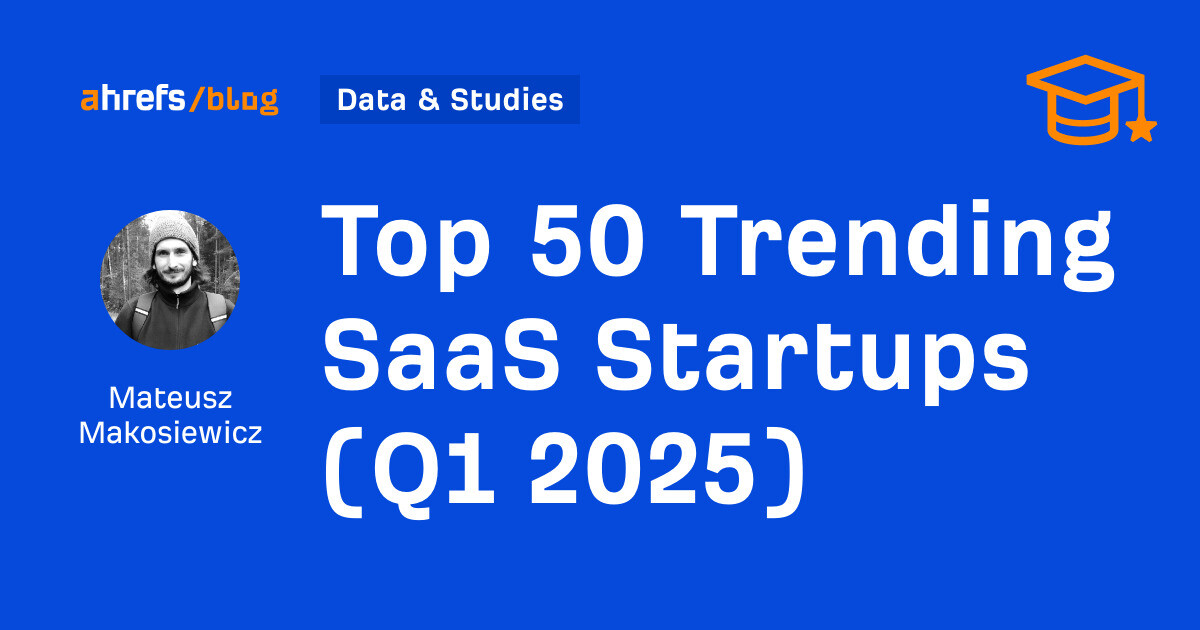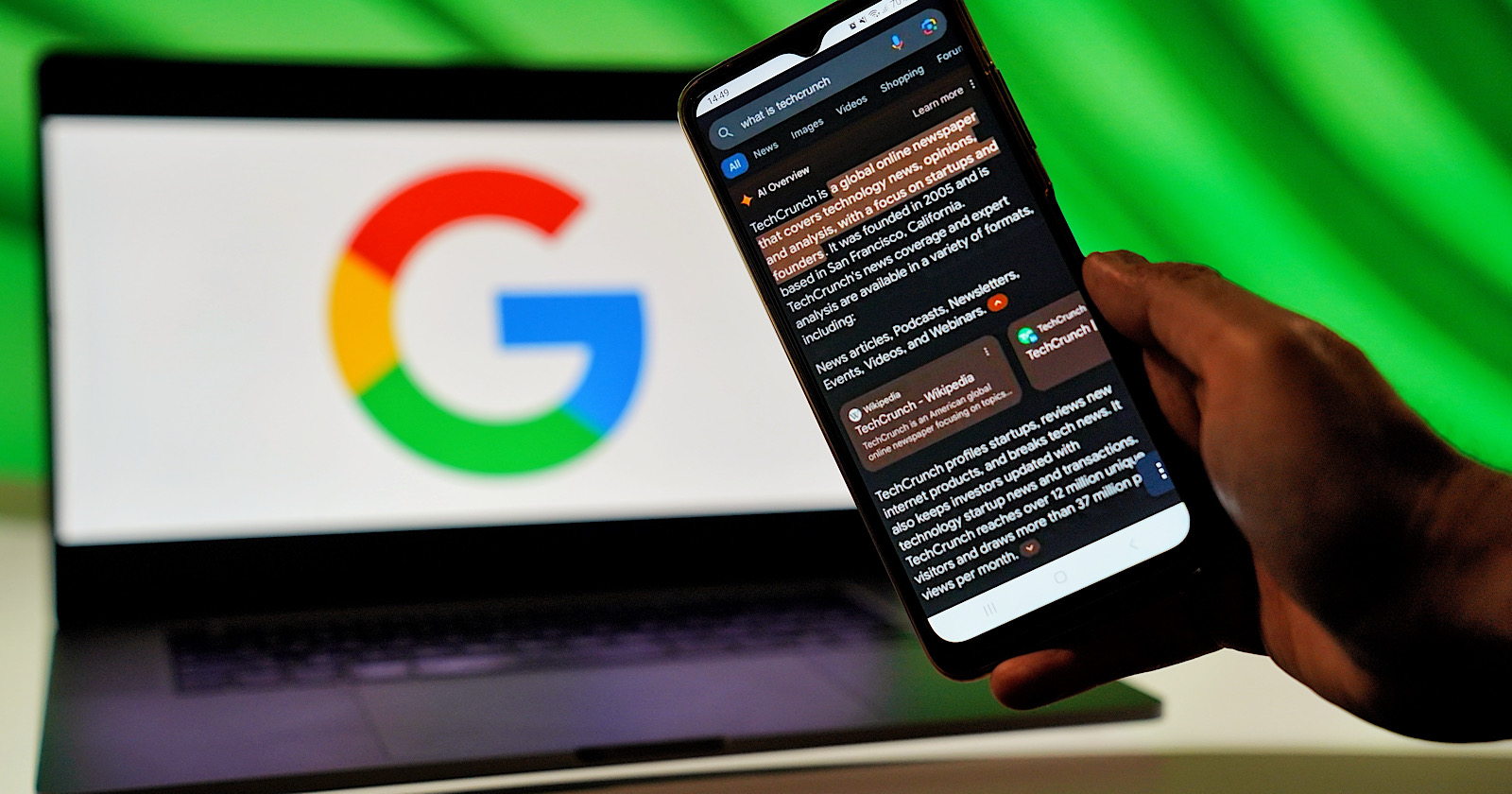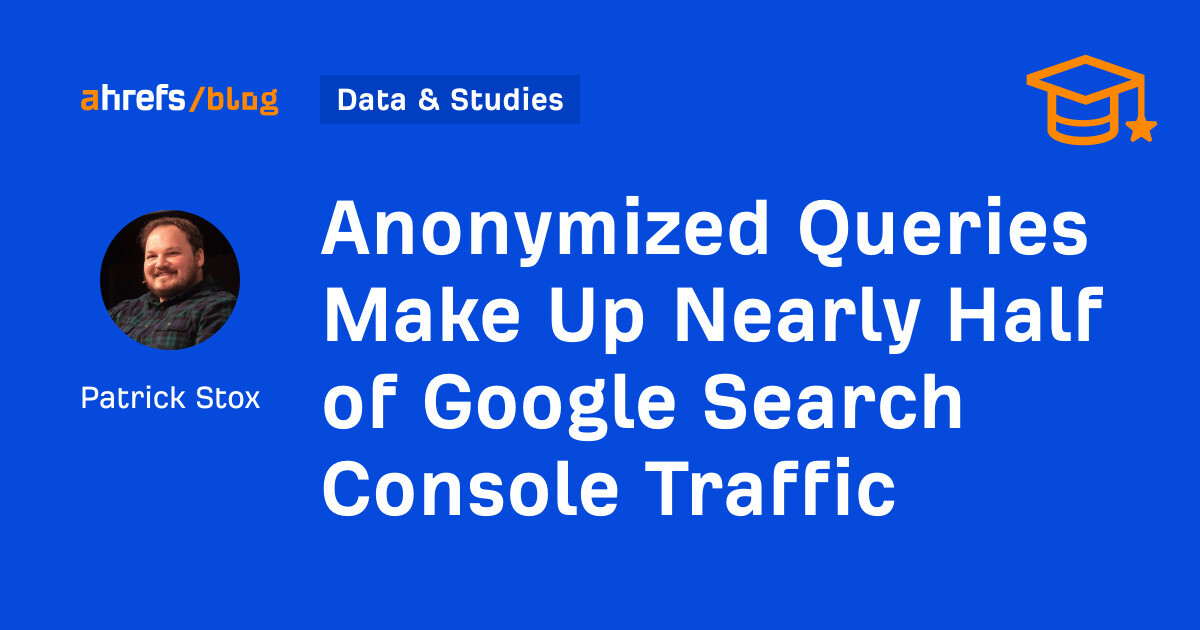7 Powerful AI Marketing Tools You Need (Tested)
Seen your LinkedIn lately? AI marketing tools are everywhere. And each one promises a bigger ROI than the last. The truth? It’s not necessarily hype. AI tools actually deliver impressive returns. In fact, you get a 3.7x return for...

Seen your LinkedIn lately? AI marketing tools are everywhere.
And each one promises a bigger ROI than the last.
The truth? It’s not necessarily hype. AI tools actually deliver impressive returns.
In fact, you get a 3.7x return for every dollar you invest in generative AI.
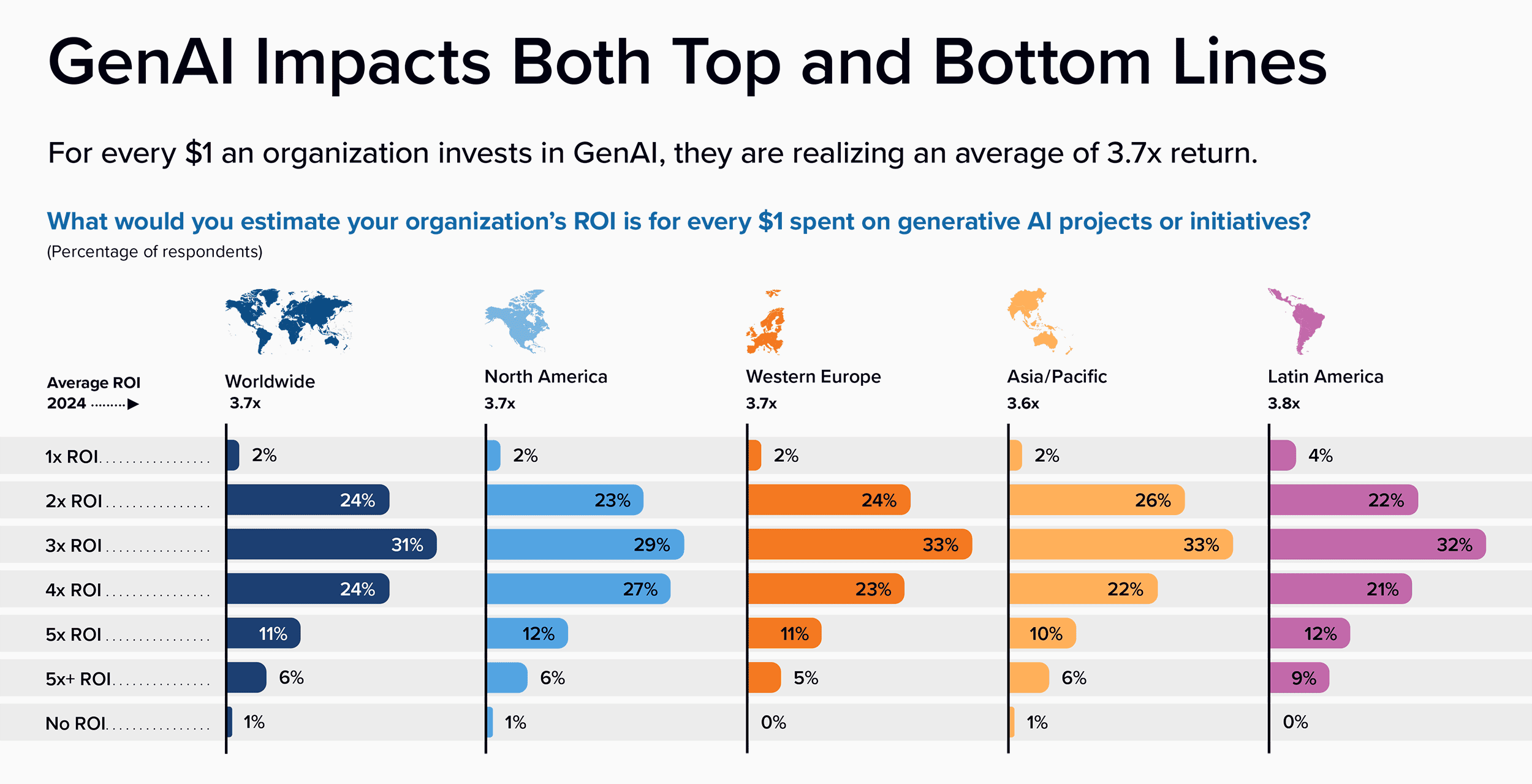
But ONLY if you pick the right tools.
So, to save you the guesswork, I tested seven popular AI marketing tools for various tasks. Including writing, video creation, and customer research.
Check out my in-depth reviews below for the full picture.
Short on time? View each tool’s highlights here:
What Are the Best AI Marketing Tools?
| ChatGPT | All-purpose AI marketing assistant | $20+/month |
| Semrush | Full-stack marketing with AI integration | $139.95+/month |
| Flick | Social media marketing on a budget | £14+/month |
| Canva | Fast visual content creation | $15+/month |
| Synthesia | Video creation without filming | $29+/month |
| AdCreative.ai | Scaling high-performing ads | $39+/month |
| HubSpot | AI marketing automation | $20/month/seat |
1. ChatGPT
Best all-purpose AI marketing assistant
Price: $20+/month; limited free plan available
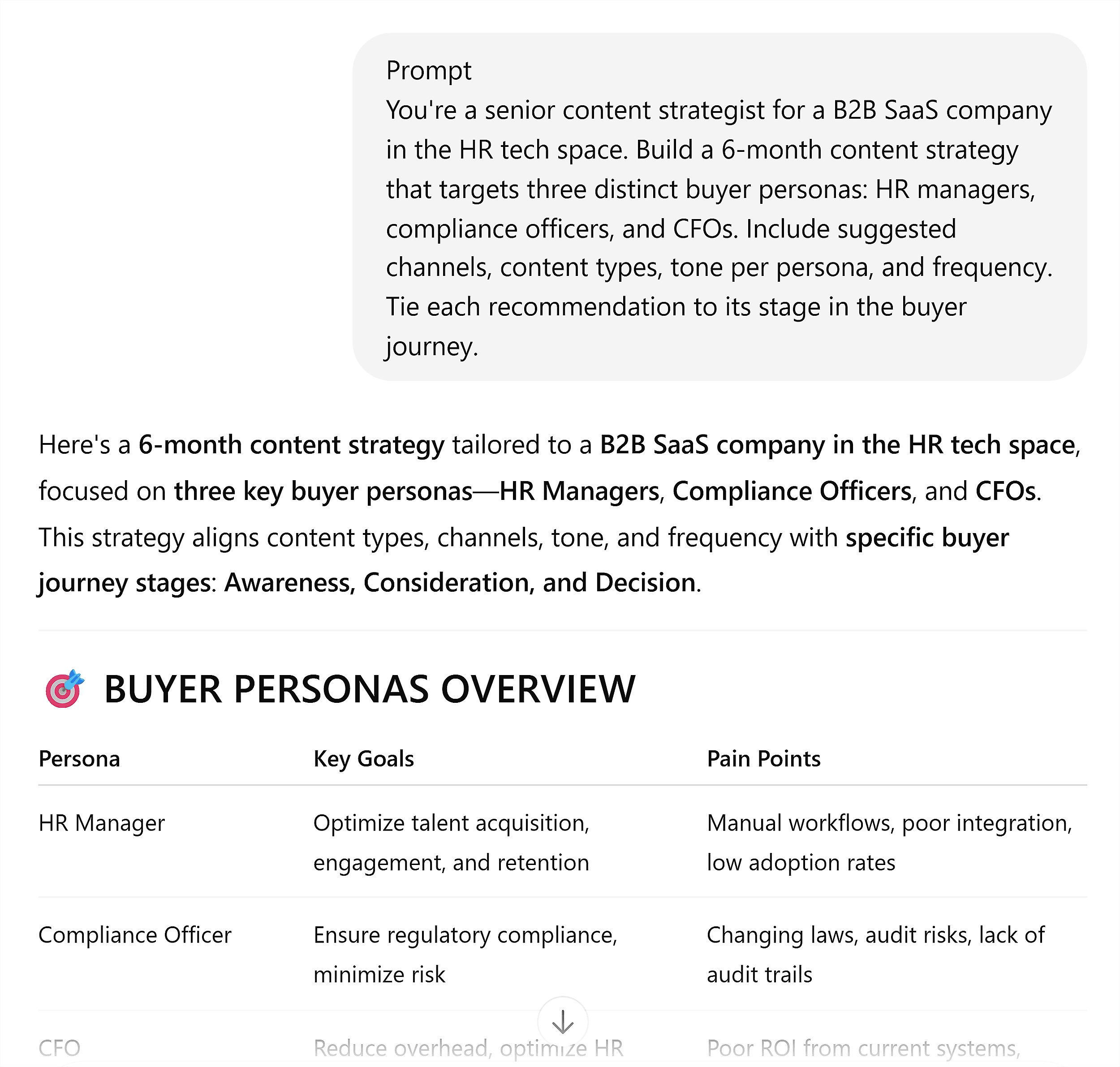
I can’t write about the best AI tools for marketing without starting with ChatGPT.
The large language model (LLM) isn’t just popular.
It actually gets more searches than “AI.”
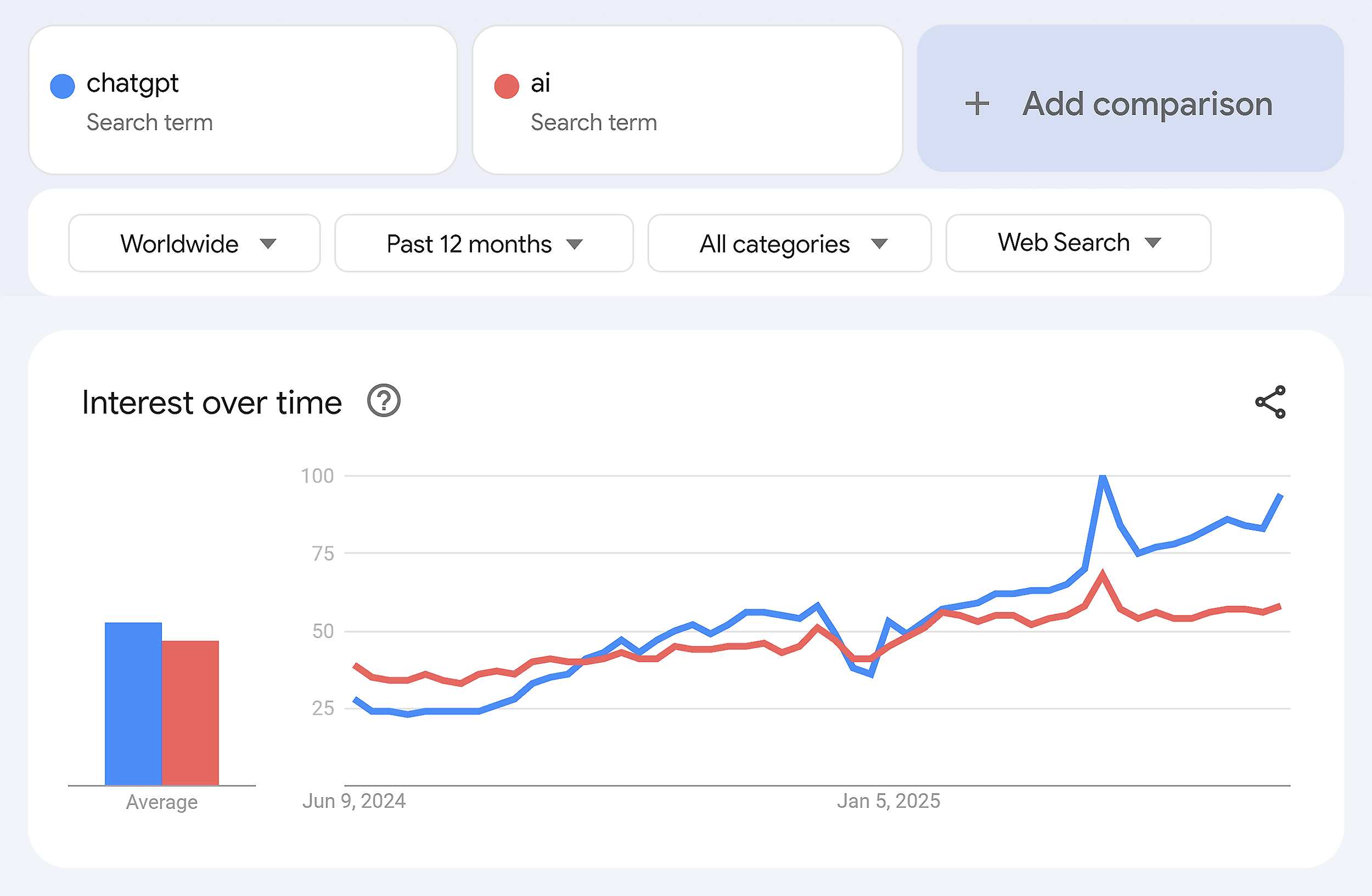
What makes it so good?
It can handle just about any marketing task, customized to your industry.
From a quick Instagram caption for your DTC skin care company to a detailed content strategy with audience segmentation, ChatGPT does it all.
But here’s the not-so-secret secret: ChatGPT is only as good as your prompts.
Bad prompts = bad answers.
But learn how to communicate with ChatGPT effectively (aka prompt engineering), and it becomes the ideal AI tool for marketing teams.
Create Relevant First Drafts
ChatGPT helps you go from blank page to first draft on any topic, fast.
(For more, check out our guide: How to Use AI for Writing Exceptional Content.)
The tool can significantly speed up the content creation process, no matter the format.
This includes SEO blog posts, product descriptions, email campaigns, and more.
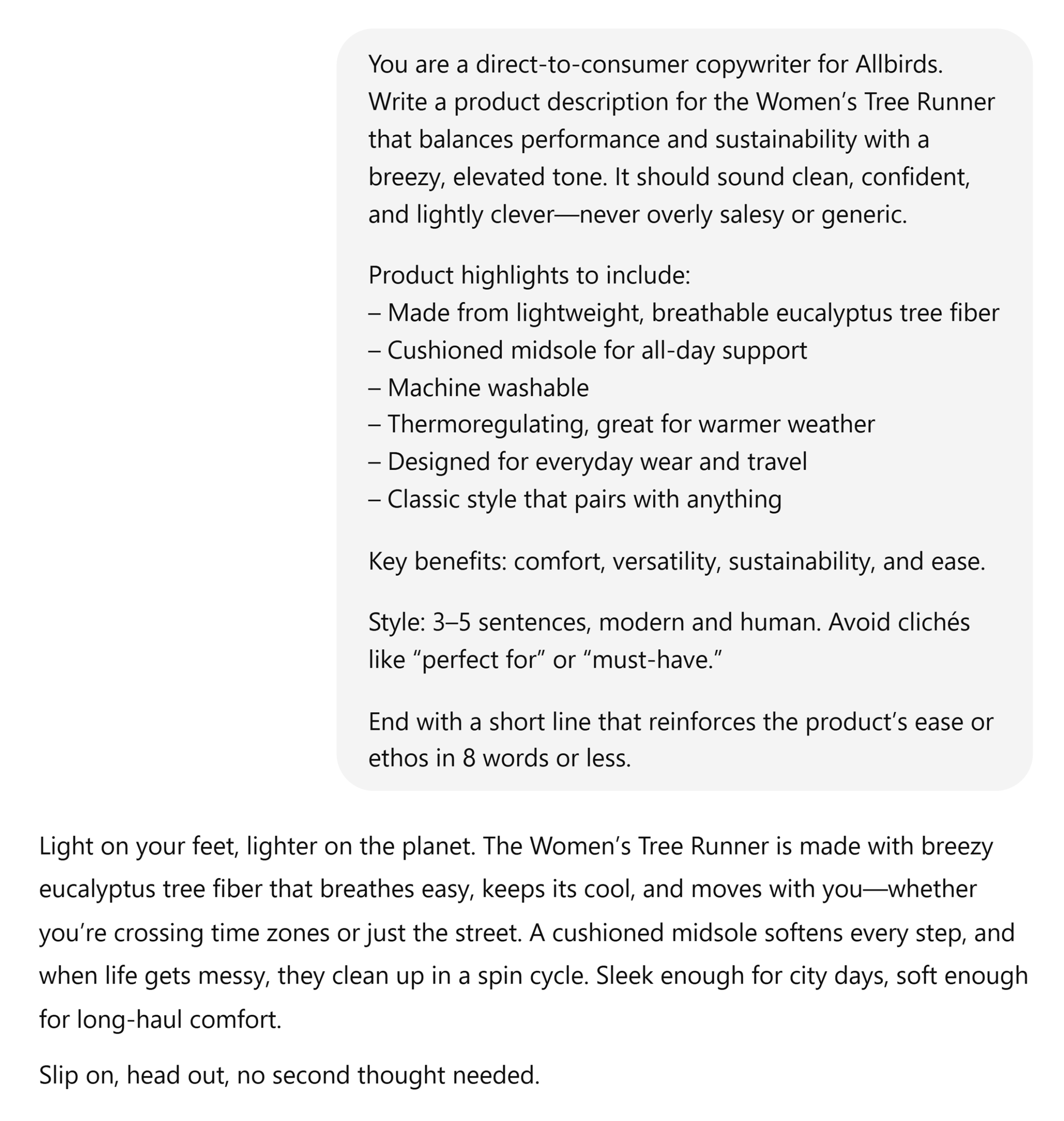
For example, I often use it to organize my ideas and draft marketing content more efficiently.
I typically provide it with custom inputs like:
A content brief and project guidelines Data from tools like Semrush Competitive intelligence Initial research notesBy feeding this information up front, the output becomes more relevant to the project goals.
But this isn’t copy-paste content writing right out of the gate. Every output still needs a human pass.
You’ll also likely need to refine your prompt multiple times to get the highest quality results from ChatGPT.
Accelerate Customer Research
ChatGPT is a powerful support tool for customer research.
Use it to:
Write better survey questions Analyze sentiment Extract actionable insights from raw feedbackFor example, voice of customer (VoC) research used to be my biggest time-sink for conversion optimization projects.
I’d spend weeks organizing data and tagging themes.
Now, I run the same process with ChatGPT in a fraction of the time.
I attach dozens of customer reviews from Google, TrustPilot, and internal surveys. Then, ask it to identify sentiments and motivations.
It takes care of the grunt work and identifies patterns fast.
(So, I can focus on finding valuable insights, not just sorting through data.)
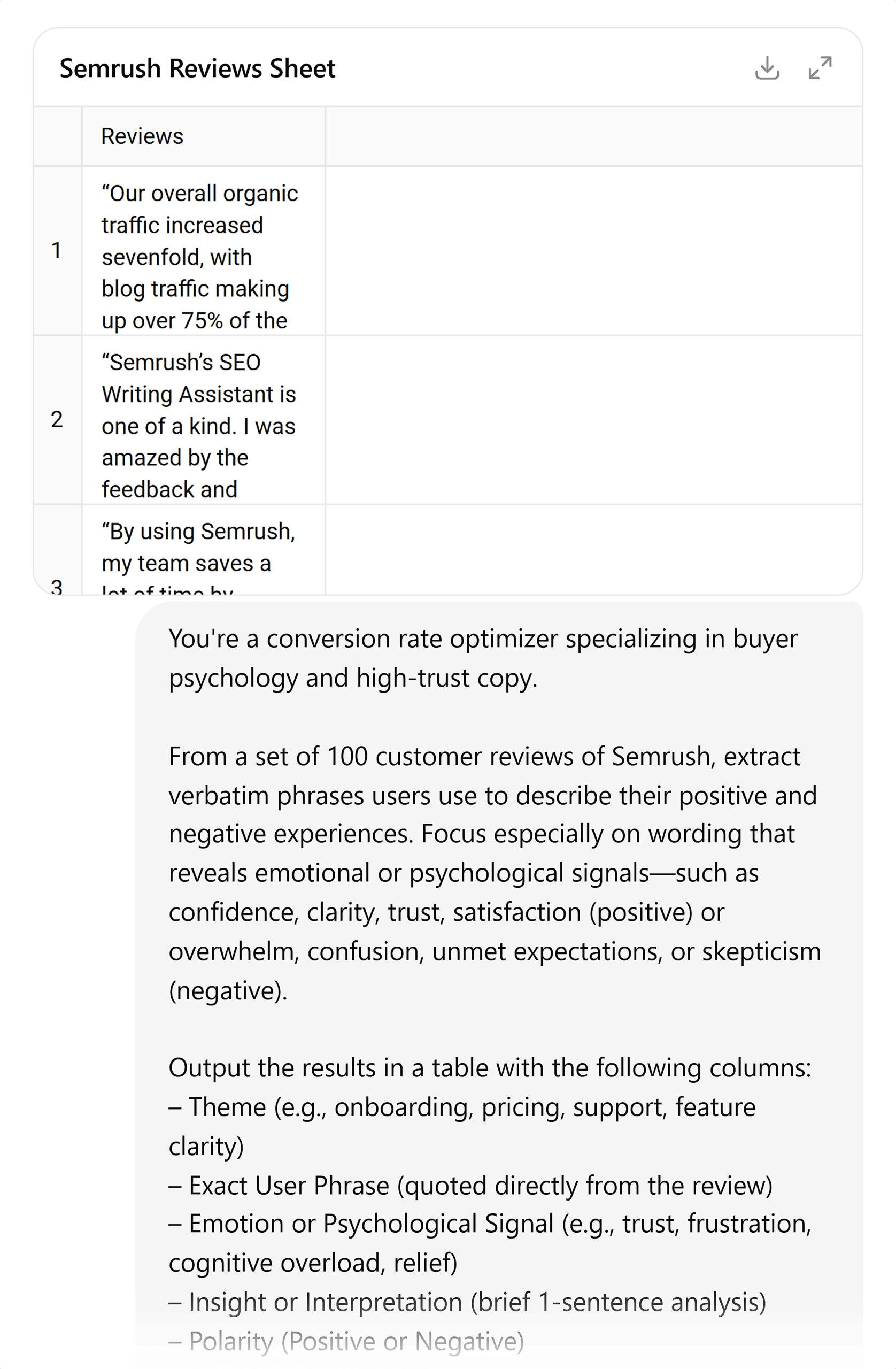
This same process also gives me the exact language customers use to describe their challenges.
I then use that language to write copy that resonates and build experiences that address customer pain points.
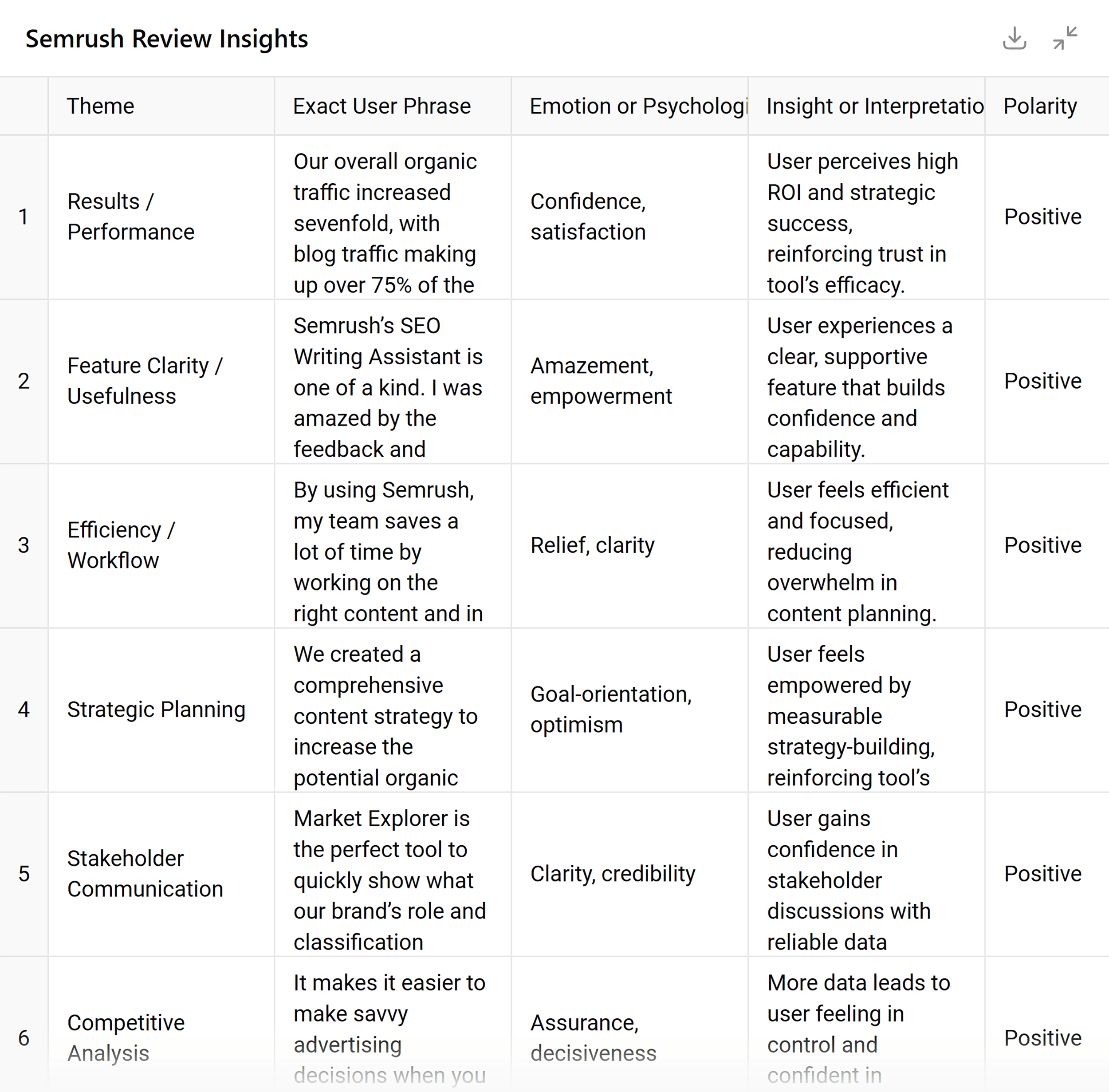
Pros and Cons
| Multi-purpose AI assistant that adapts to any marketing task
Customizable to your brand voice, tone, and messaging style |
Answers are only as good as your prompting skills
Prone to hallucinations. Need subject-matter expertise to avoid generic or inaccurate content. |
2. Semrush
Best for full-stack marketing with deep AI visibility
Price: $139.95+/month; AI Toolkit and Enterprise AIO require separate plans
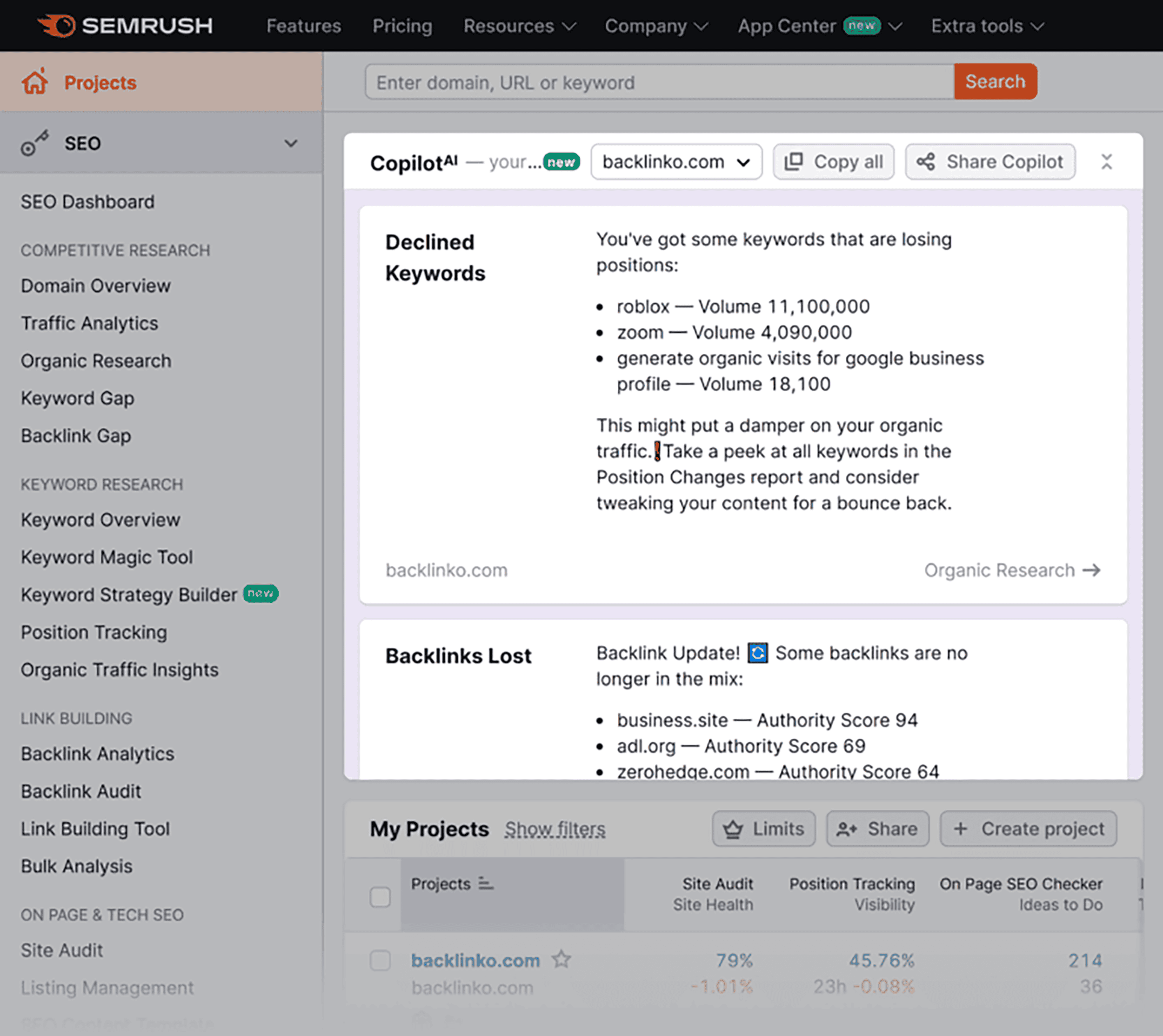
Semrush is quickly becoming one of the most versatile AI-powered marketing platforms out there. It’s no longer just an SEO tool.
Whether you’re building an SEO strategy, planning content, launching paid campaigns, researching competitors, or tracking how your brand shows up in AI-generated answers — Semrush has a solution for it.
And unlike many startups racing into the AI space, Semrush brings something most don’t: infrastructure. It’s backed by more than a decade of data, crawling power, and product development.
Here’s how you can use Semrush to get ahead in the AI-powered marketing landscape:
Track Your Brand in AI Search
The most powerful thing Semrush offers in the AI space is visibility. Specifically: How is your brand showing up in AI-generated answers across LLMs?
That’s where Enterprise AIO comes in.
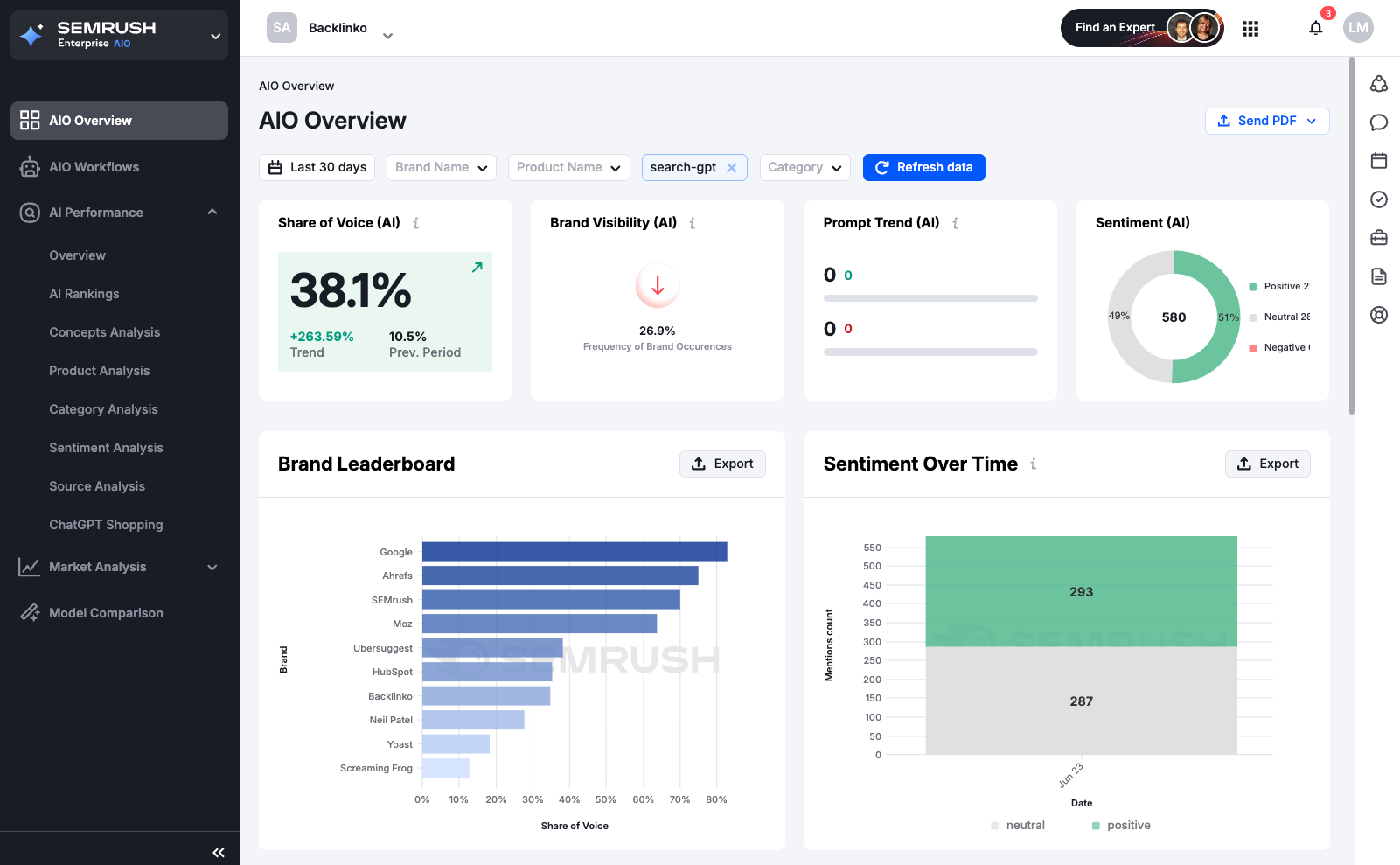
It tracks your brand across ChatGPT, Gemini, Perplexity, Claude, and Google AI Overviews — measuring:
Brand, product, and concept mentions Sentiment and quote-level context Share of Voice compared to competitors Citations and sources used in AI responses Visibility trends by region, topic, or modelIf you’re an enterprise or managing a well-known brand, this is the most advanced solution available.
See What AI Platforms Say About You
The Semrush AI Toolkit is built for SMBs, lean teams, and growing brands that want to understand how AI platforms talk about them — and where they can improve.
For $99/month per domain, you can:
Monitor your brand’s presence in ChatGPT, SearchGPT, Perplexity, Gemini, and more Track Share of Voice and sentiment over time Discover high-intent queries and emerging topics Get recommendations on where to improve content and messagingIt’s not “lite” — it’s focused. And for many teams, it’s exactly what they need to stay visible in the AI-driven search landscape.
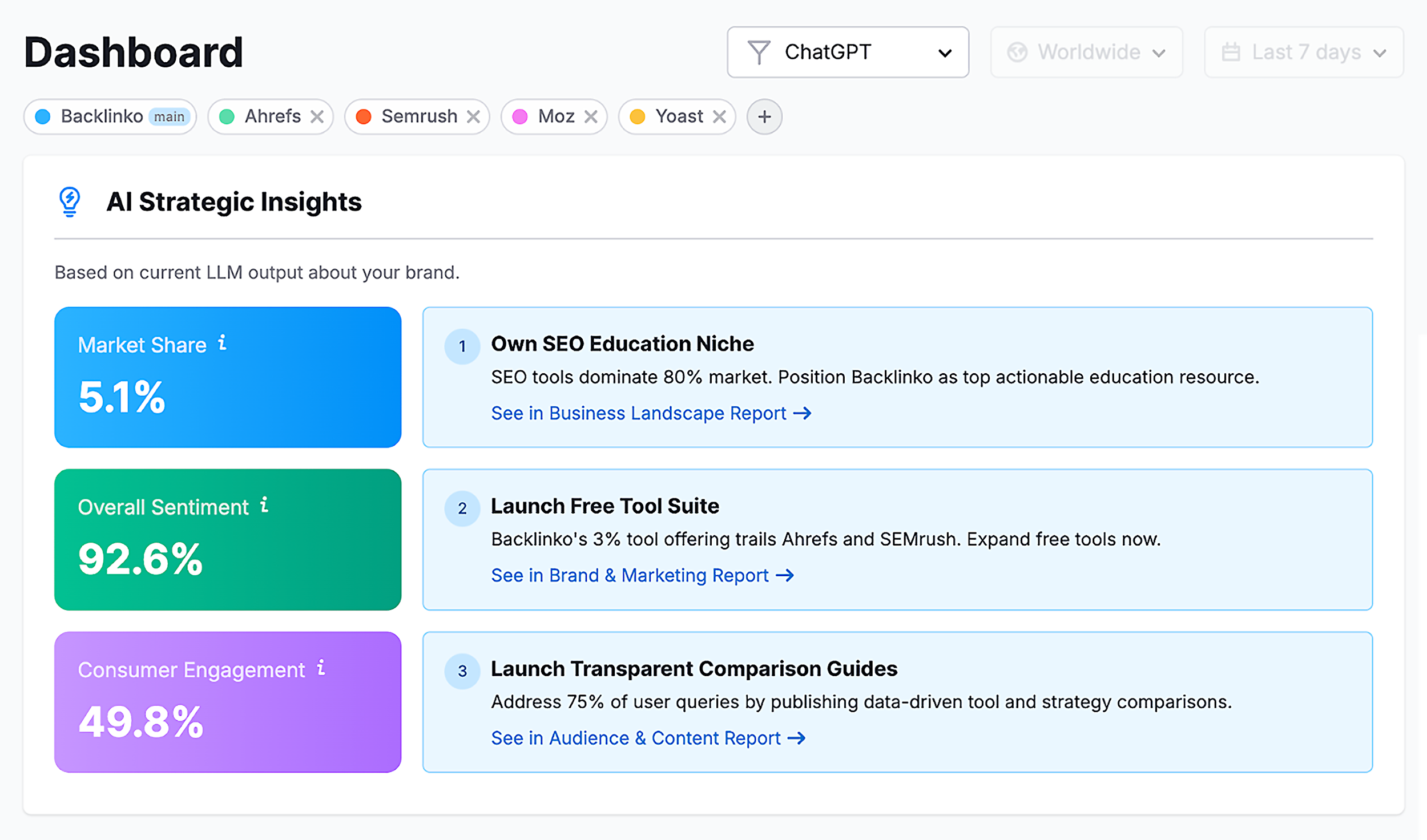
It even provides recommendations based on AI query data and sentiment trends.
This means you can quickly jump on emerging topics in your industry.
Or address user concerns before they become a problem.
For example, when I entered the domain warbyparker.com (an eyeglass company), the AI Toolkit revealed that users repeatedly asked about unclear payment and financing options.
The tool also made a helpful recommendation to solve this problem:
Clearly communicate financing details on the website and in the checkout flow.
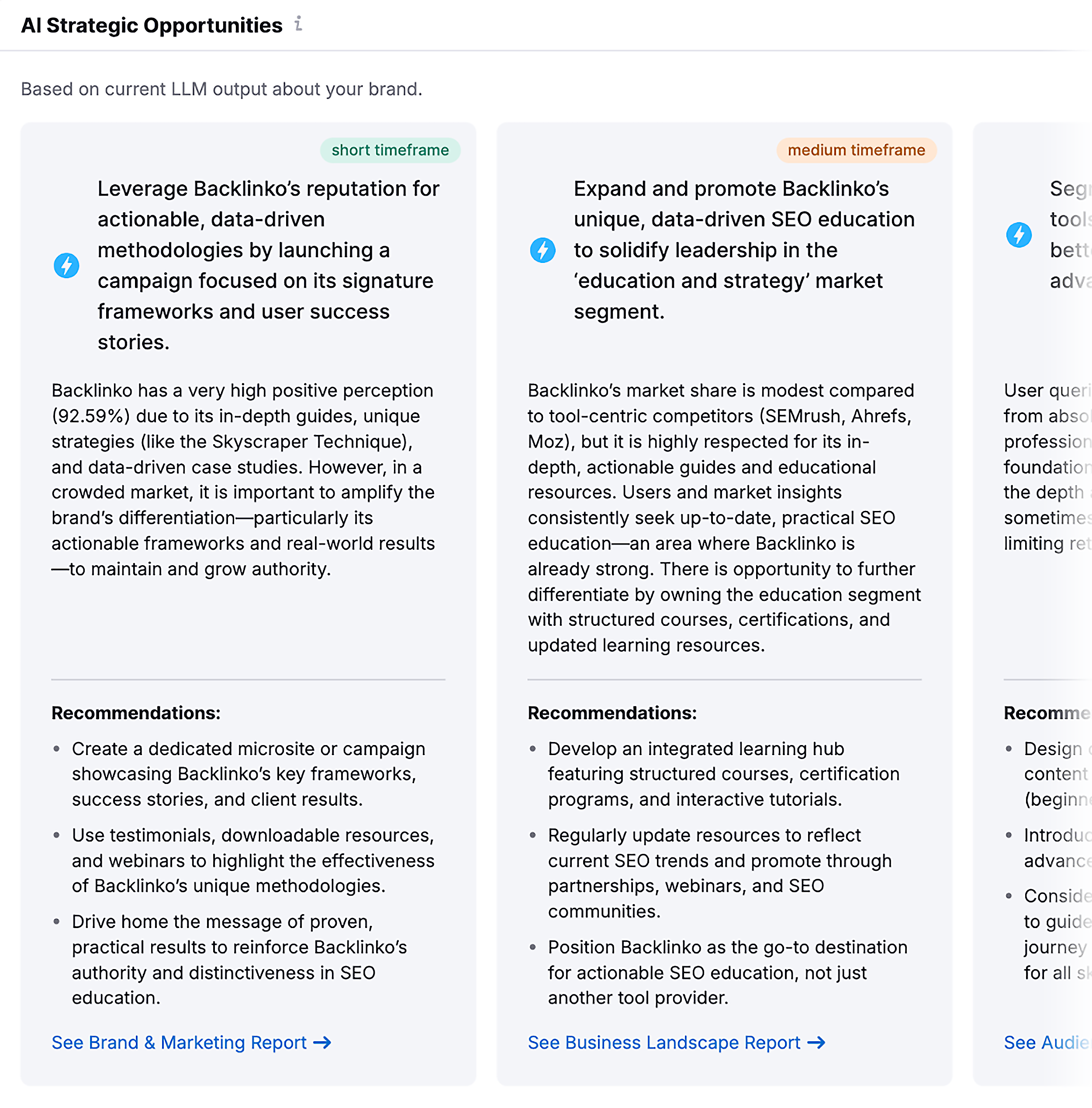
That’s the real value here: The Semrush AI Toolkit doesn’t just give you data.
It also surfaces patterns from user queries. So you can identify pain points and fix them before they can hurt conversions.
Keep Social Content on Brand
The Semrush Social Media Toolkit uses AI to help you create and organize a social strategy.
It lets you easily create weeks of on-brand content in minutes. And schedule it across major platforms so your posting stays consistent.
Here’s how it works:
The AI-powered tool finds trending topics your audience cares about. (And updates daily.)
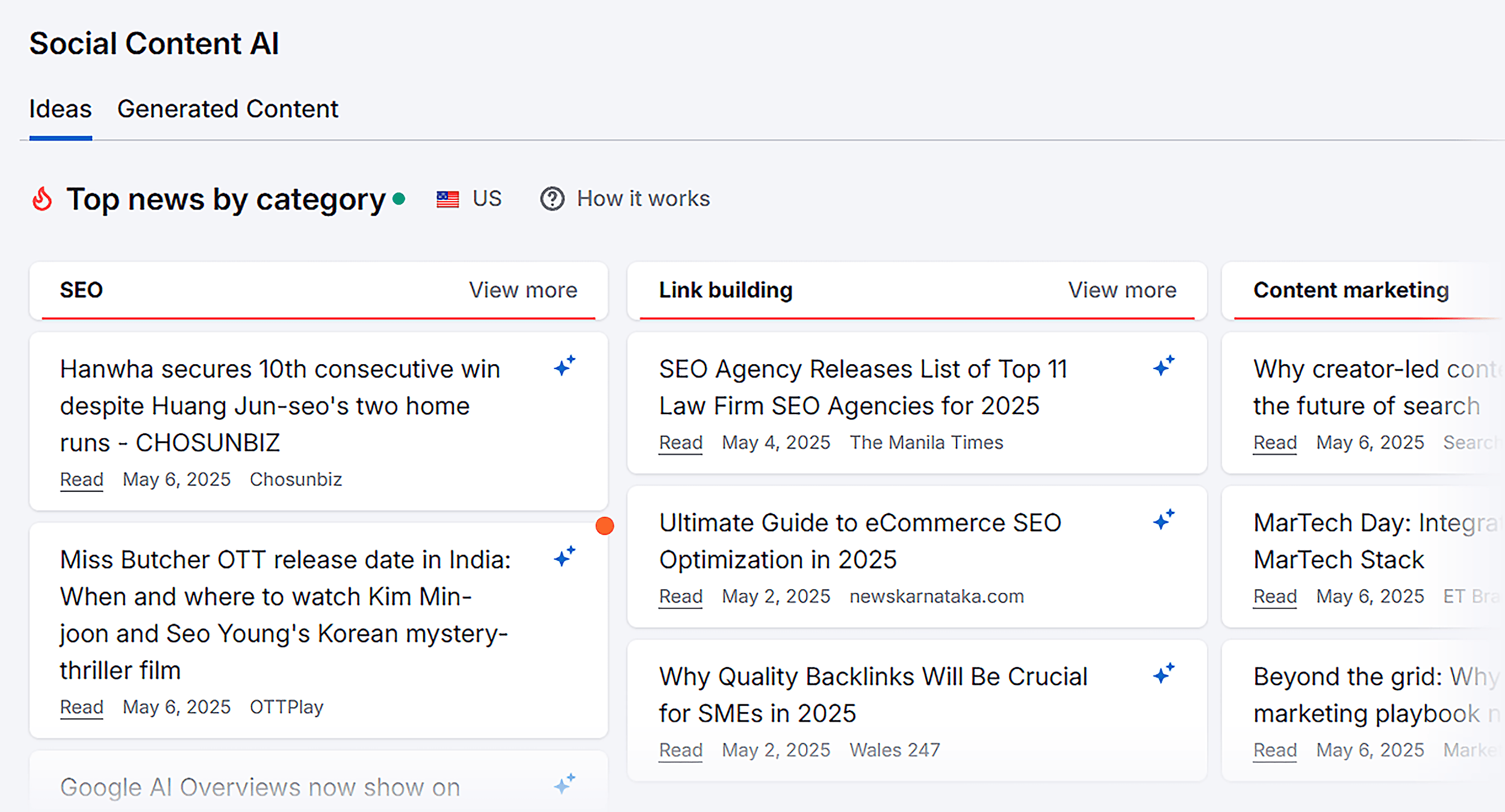
Select any topic, and the tool will auto-draft a post that aligns with your brand voice and campaign goals.
Customize it further with AI-generated hashtags, images, or scripted videos.
Finally, schedule and publish across Facebook, Instagram, X, LinkedIn, and more, with the click of a button.
Bada bing bada boom!
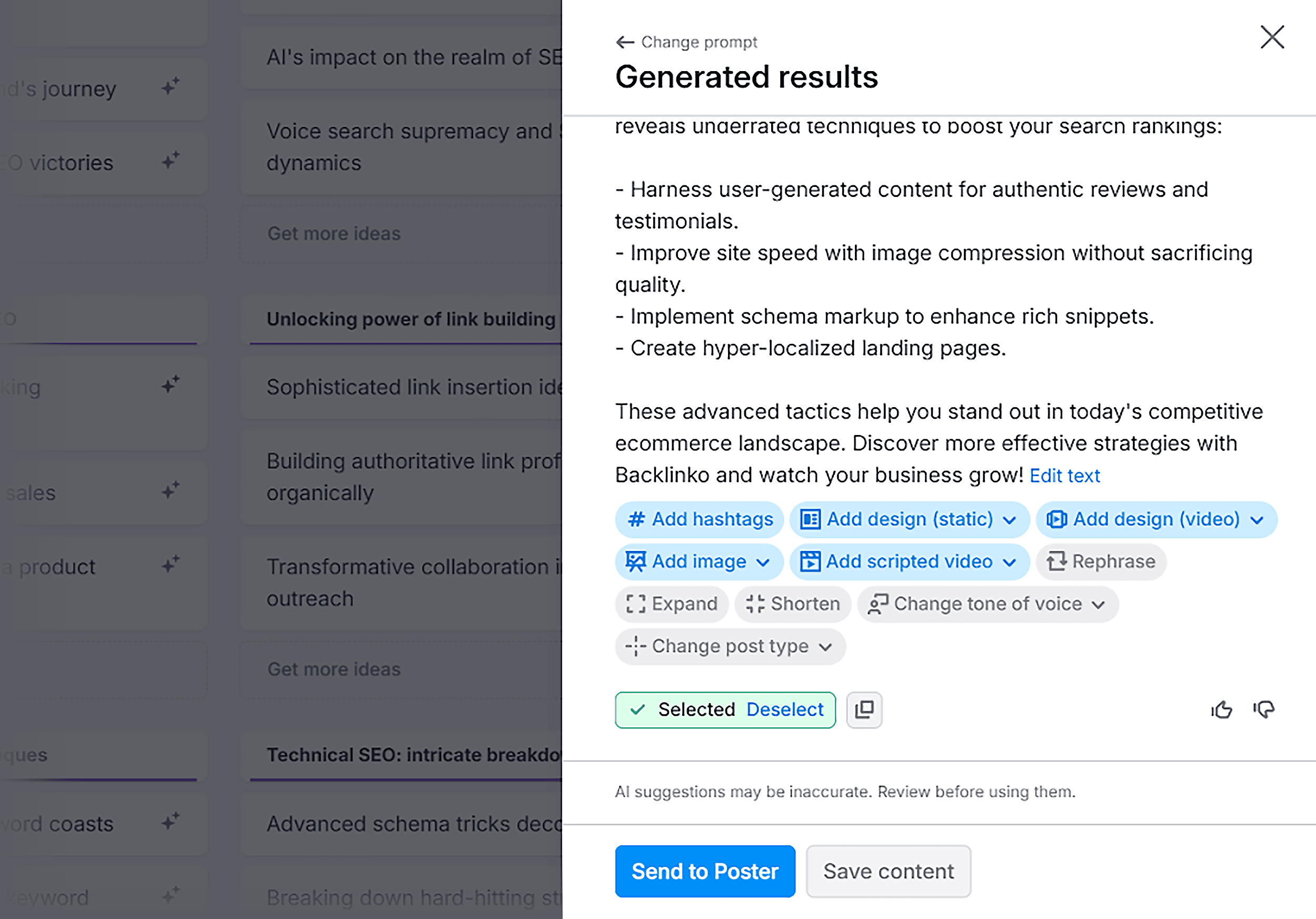
Pros and Cons
| AI integration throughout the entire platform, including SEO, PPC, and social
Tracks how your brand shows up in AI answers so you can stay ahead as search behavior evolves |
Some features (like the AI Toolkit and Enterprise AIO) cost extra beyond the base plan
May feel overwhelming at first for smaller teams or new users |
3. Flick
Best for social media marketing on a budget
Price: $18+/month; 7-day free trial available
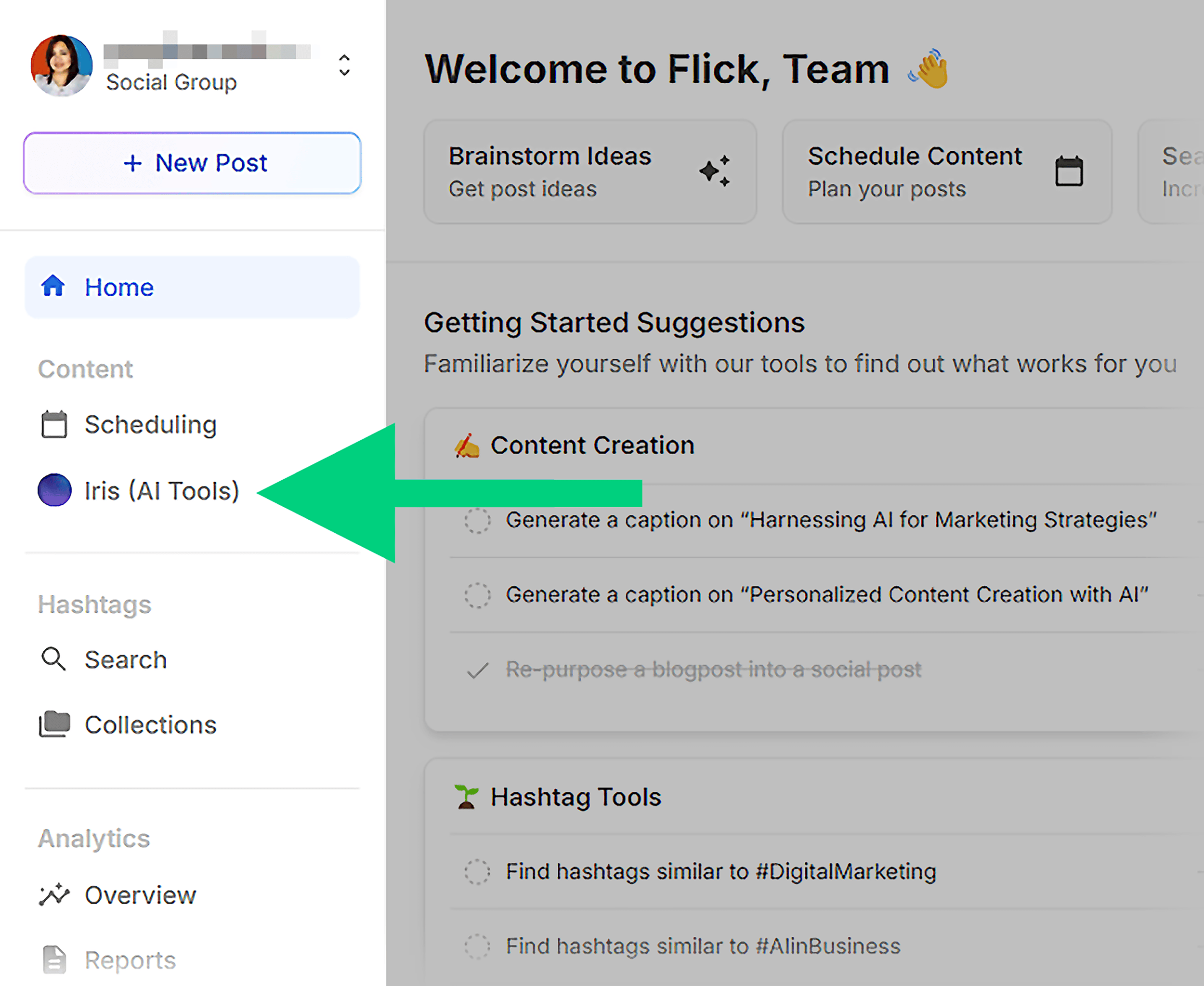
Want to look like you have a full content team without paying for one?
Use Flick.
This AI tool builds your social media marketing strategy, writes engaging posts, and maintains your publishing calendar.
Set your content pillars once in the Brand Hub, and Iris (Flick’s AI tool) will handle the rest.
This includes:
Auto-generating post ideas that align with your strategy Repurposing blog posts into ready-to-publish social content Creating a publishing calendar for Instagram, LinkedIn, TikTok, and FacebookIt’s perfect for founders and marketers juggling 17 other priorities.
(Or anyone who knows they should be posting more but never has time to sit down to plan it all out.)
Create a Social Media Calendar
Most social tools just help you schedule posts.
But Flick also helps you figure out what to post.
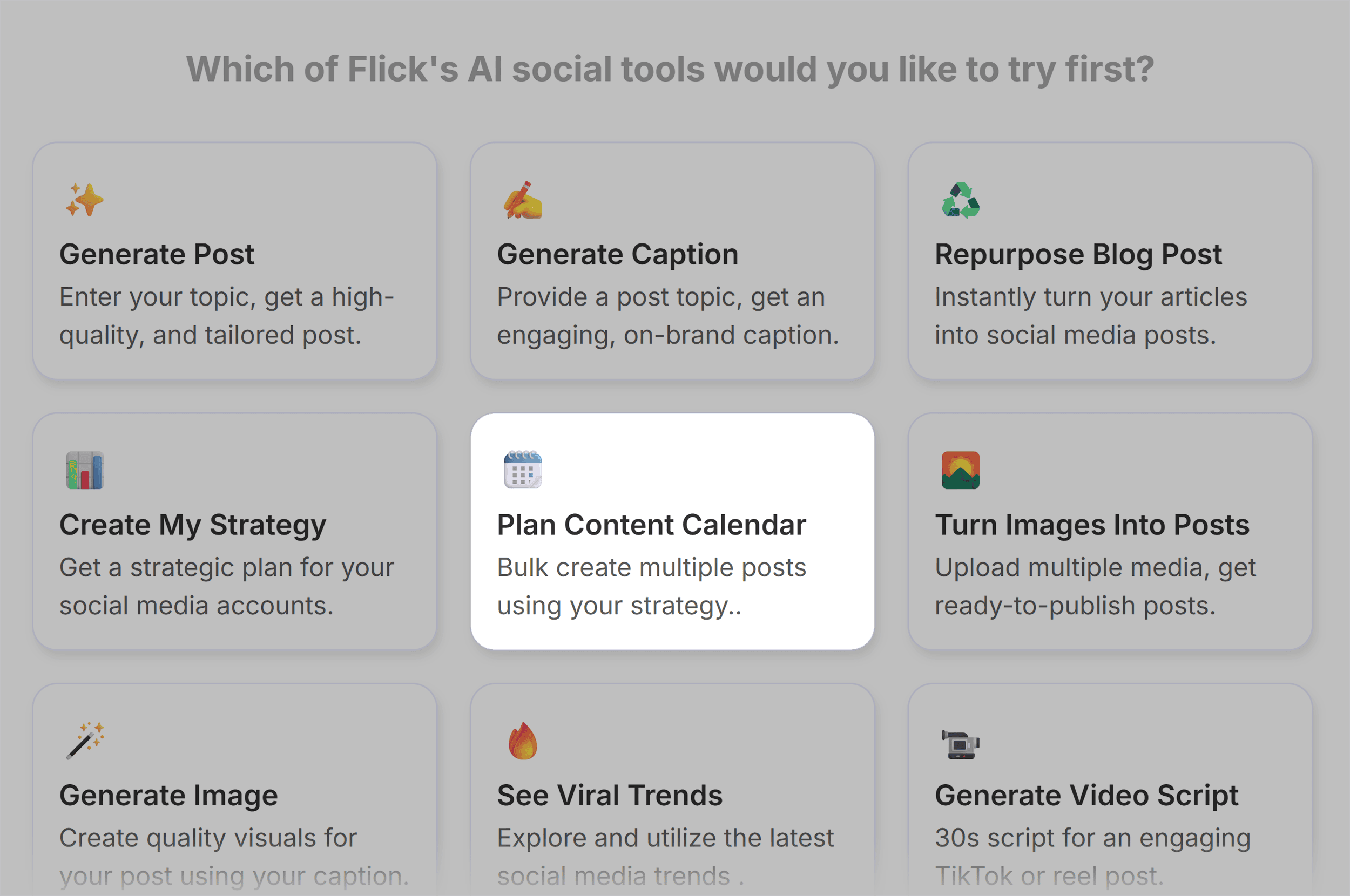
Its AI assistant helps you create a social media calendar without hours of brainstorming.
For example, I used Flick to create a 30-day calendar in under five minutes.
Here’s how I did it:
First, I set up the Brand Hub with my content pillars.
Conversion copywriting AI Funnel optimization for SaaS and ecommerceThen, I defined my brand voice and target audience.
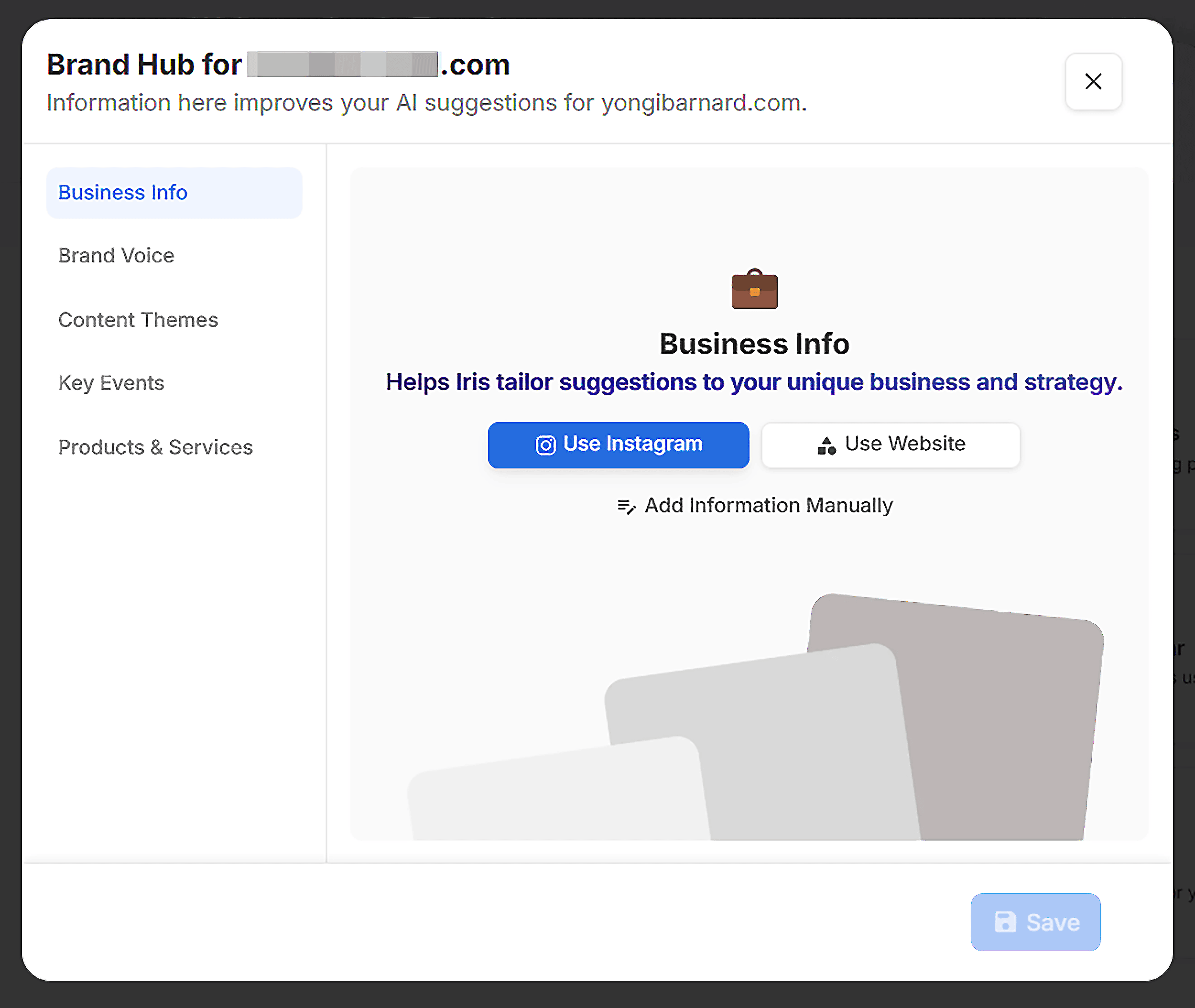
Next, I selected a time frame (I went with a full month).
And in under a minute, Iris generated a list of post ideas aligned with my content pillars.
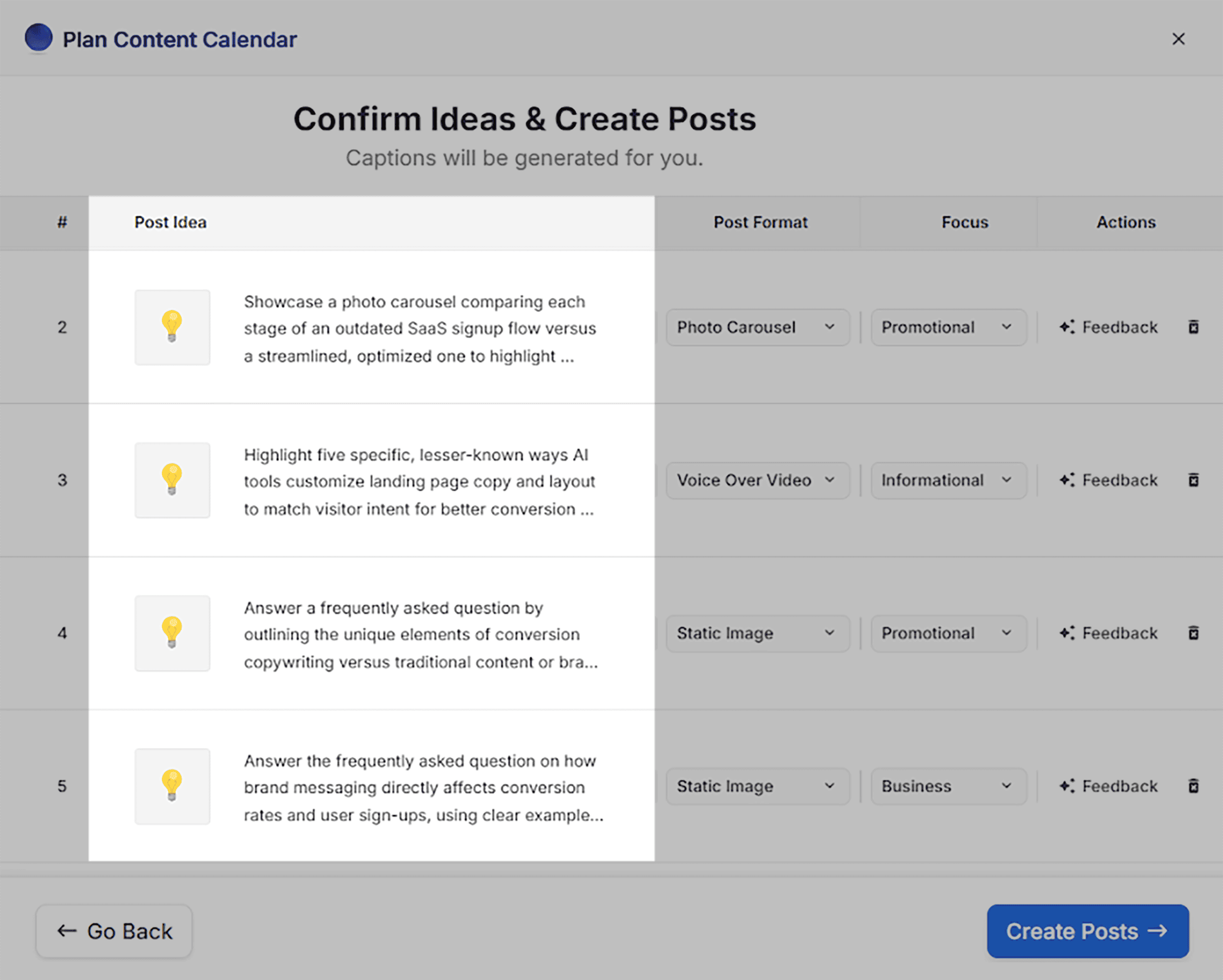
Its suggestions included:
Create a video showcasing five SaaS companies with standout value propositions Share three AI prompts marketers can use to boost email subject line performance Post before/after funnel results from a client that highlight how I increased signupsAll I had to do was click “Add to scheduler,” and my content calendar was set.
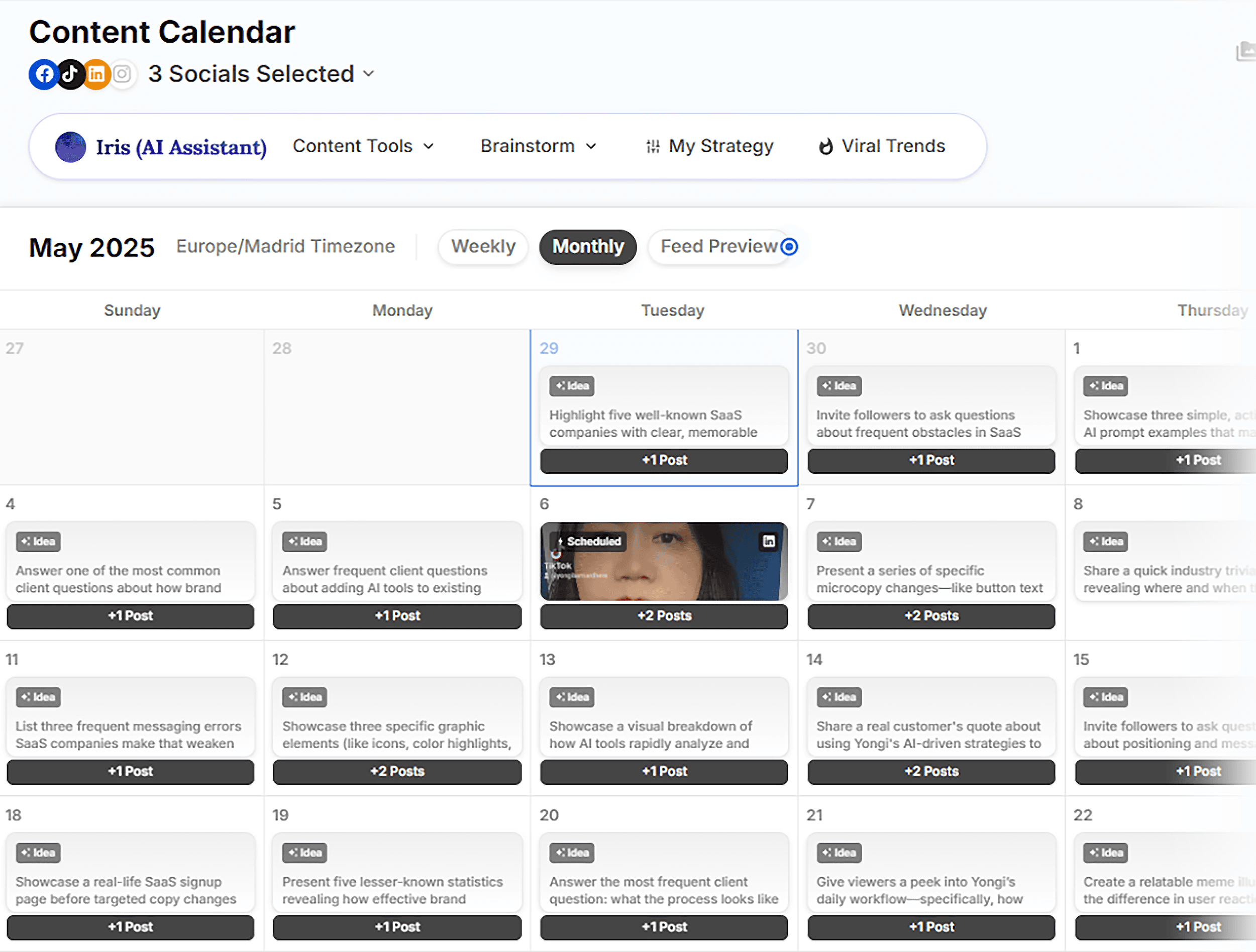
I now have a month of content ideas that I can easily turn into posts.
(Yep, Flick’s AI can write, too.)
Repurpose Long-Form Content
Got a blog post or YouTube video you worked hard on?
Flick’s “Repurpose” feature turns that content into social-ready posts.
The process is simple:
Click “Iris” > “Repurpose Blog Post.”
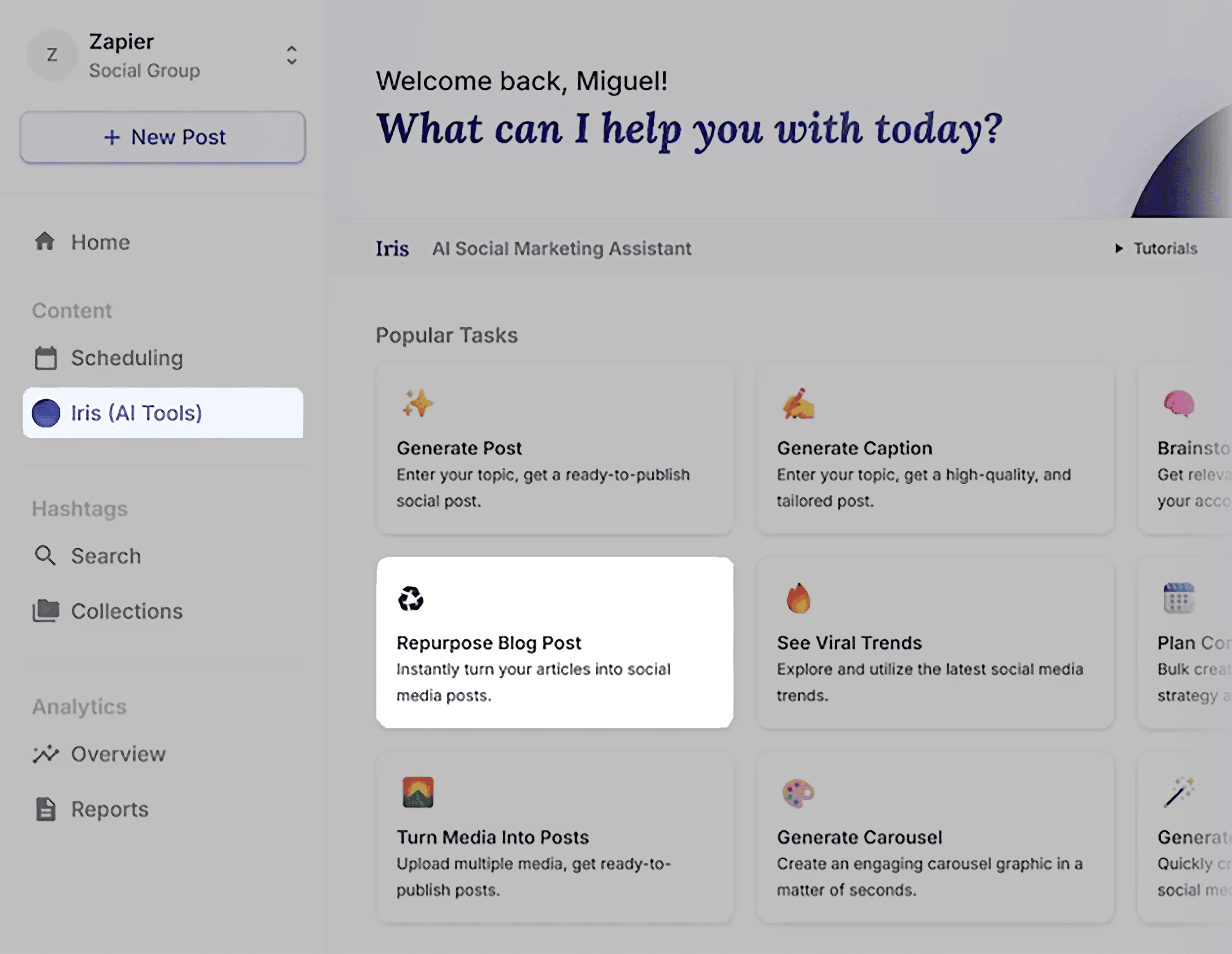
Then, enter the URL.
This can be a blog post, YouTube video, or newsletter. And that’s all you have to do.
I tested this using my AI SEO tools article.
Within seconds, Iris analyzed it and came up with four social post ideas.
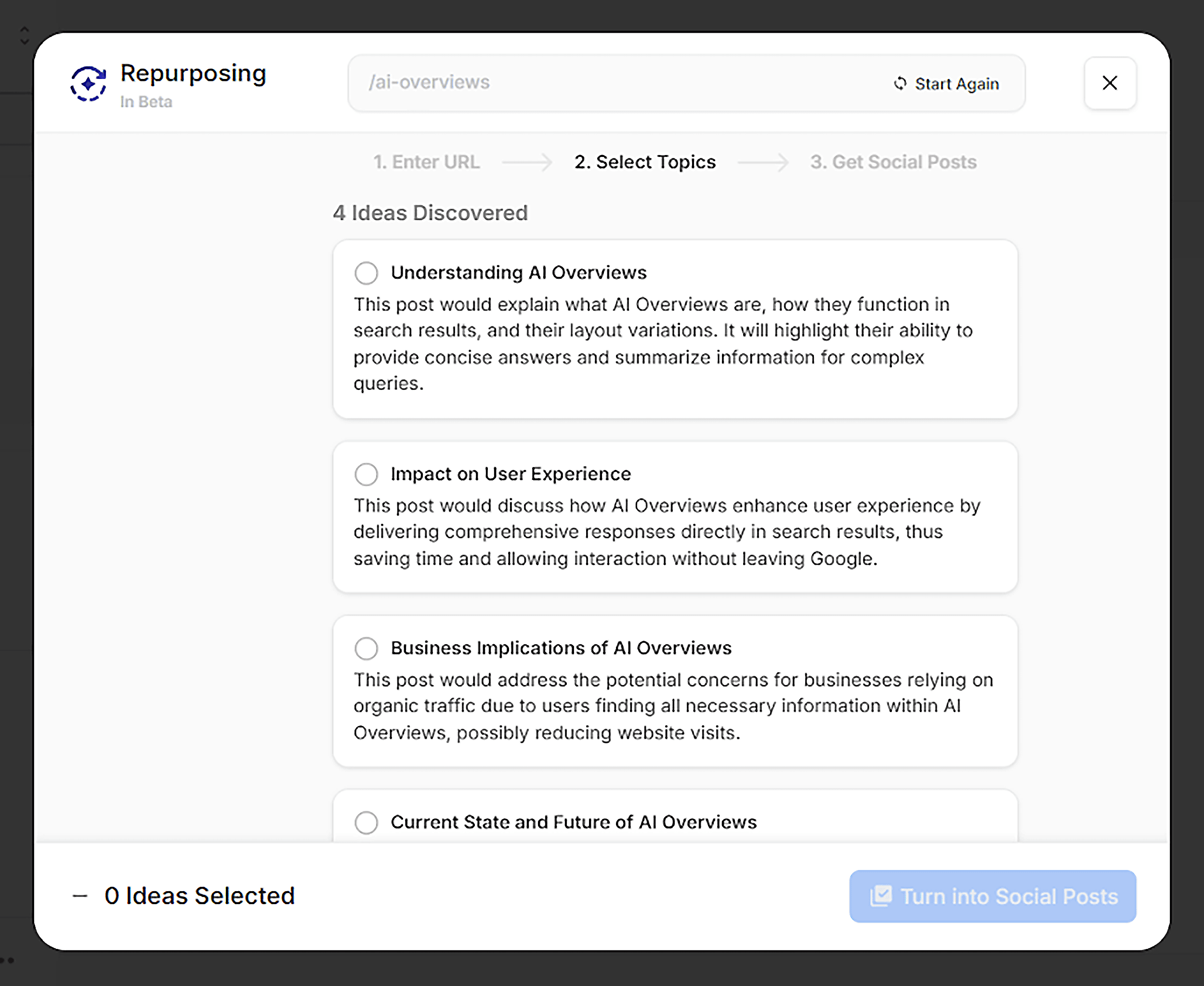
I picked one.
And the AI generated a post that captured the article’s core message.
It was perfect for social.
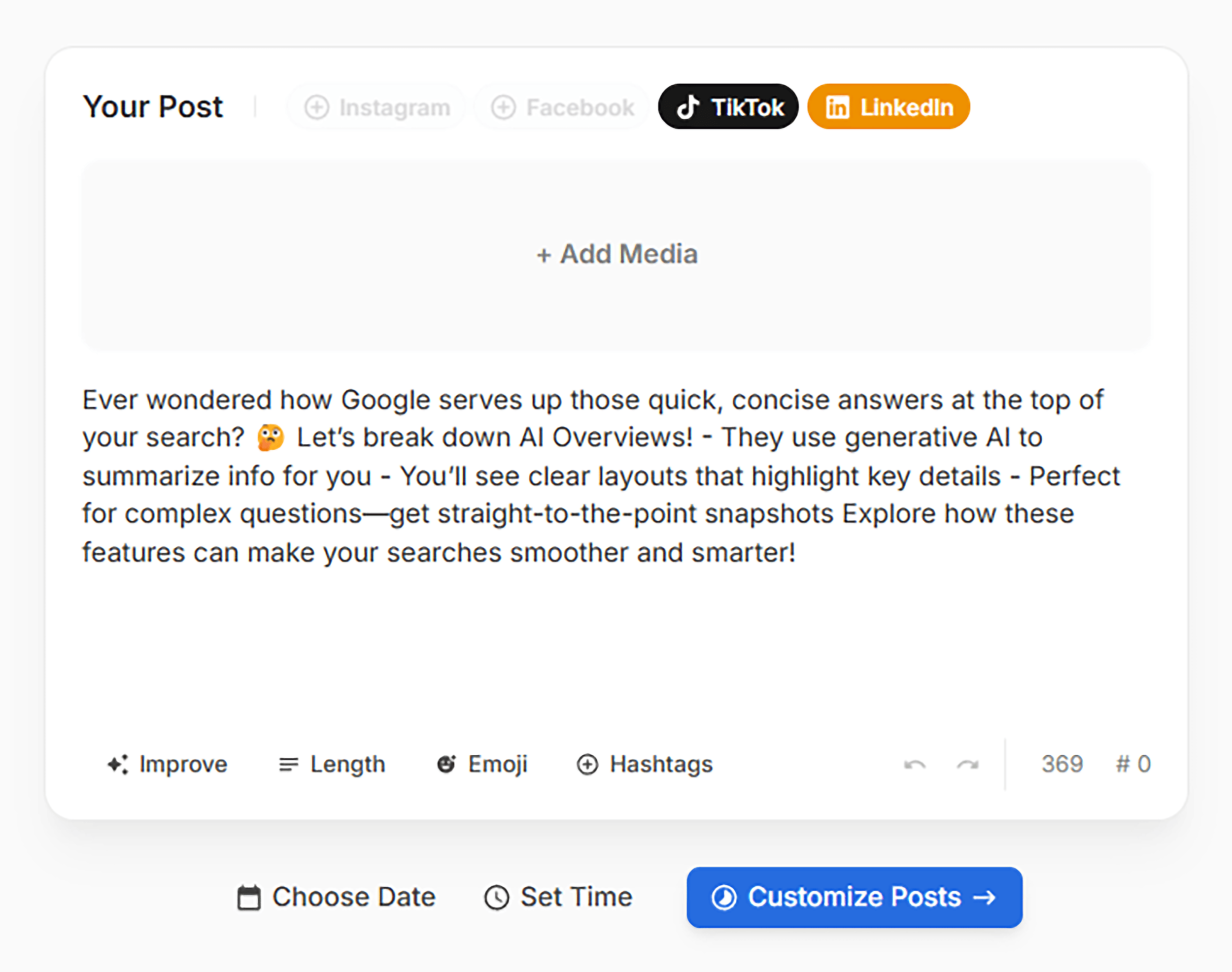
For each post, you can:
Adjust text length from one line to full caption Refine hashtags for better reach Attach media Schedule postsYou also have the option to customize each post for different social media platforms.
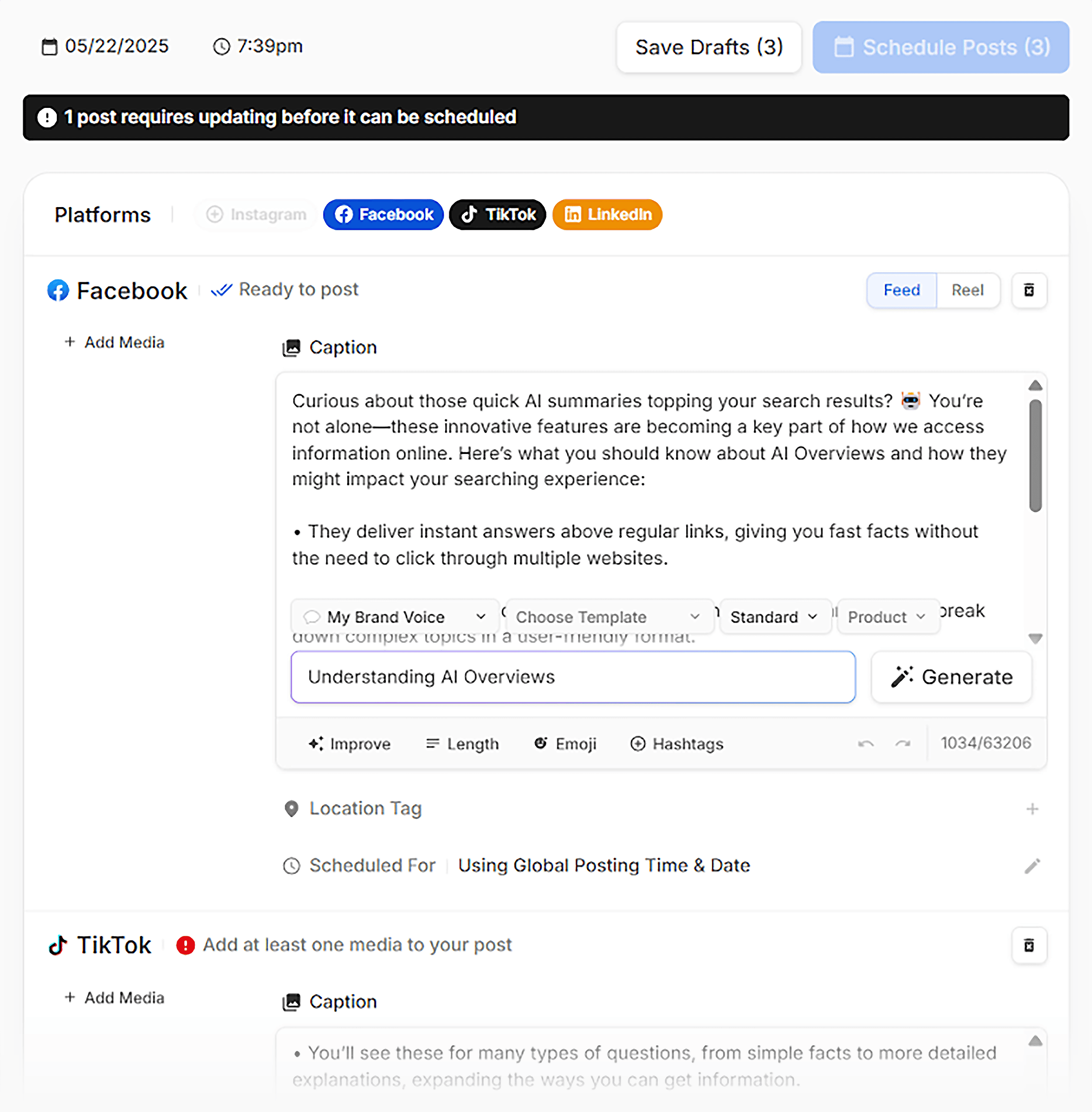
Pros and Cons
| Scheduler is integrated with AI features, so you can go from idea to post without switching tools
Built-in brand voice training means the AI can mimic your brand voice and tone in all your posts |
Limited to social content. Not ideal for broader marketing tasks
No analytics or cross-platform ad management like you’d find in tools like Semrush |
4. Canva
Best for fast visual content generation
Price: $15/month; free plan available
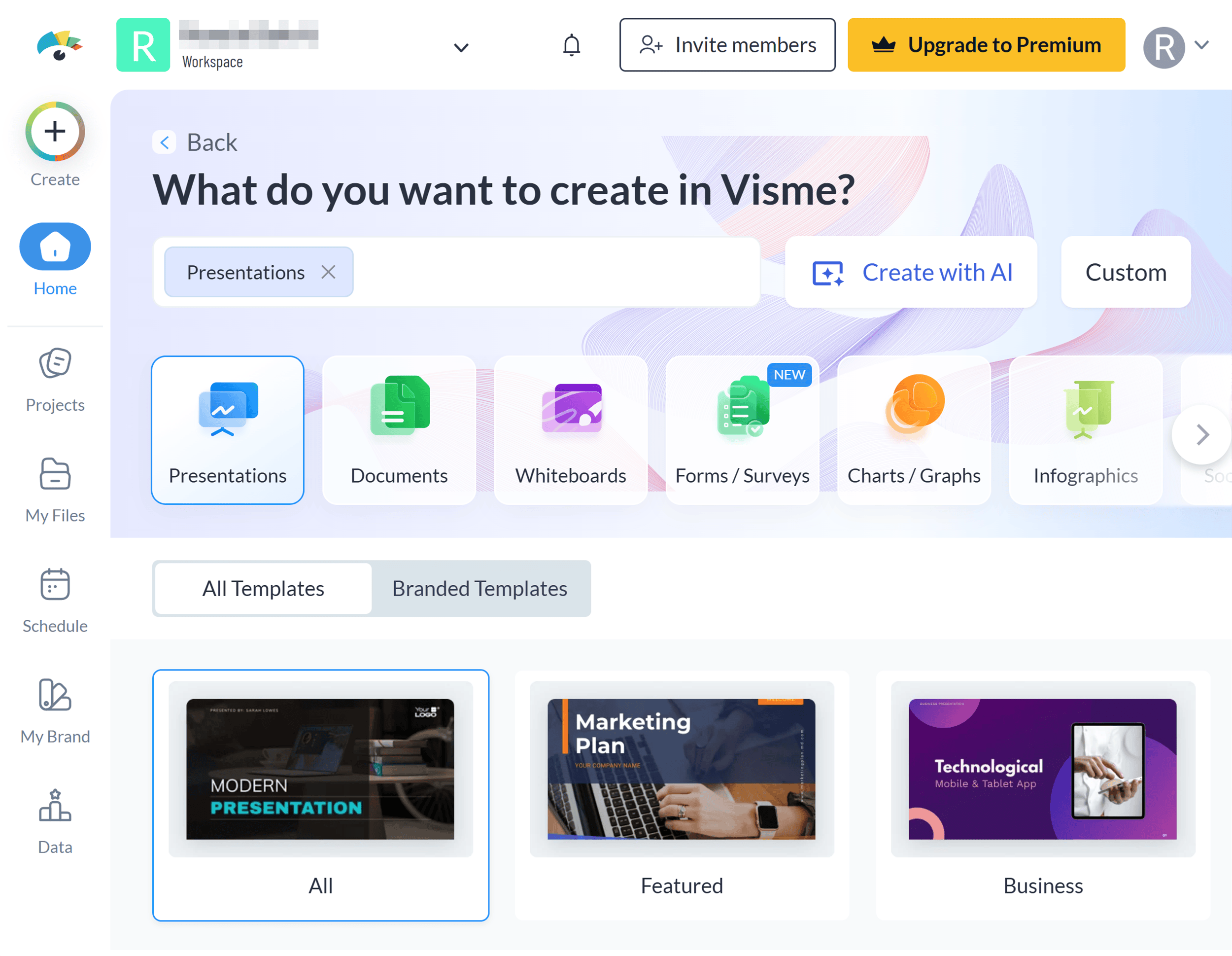
You probably already know Canva.
This graphic design tool lets you create anything from a tweet graphic to a full marketing campaign.
But now it’s added AI into the mix with its Magic Studio.
Provide a prompt, and the tool will design a graphic, write image text, and even generate code.
From first idea to final creative, Canva’s AI speeds up marketing design without leaving the platform.
Two things impressed me the most:
The learning curve was negligible. I didn’t need a tutorial to get started. The AI Image generation tool created exactly what I had envisionedTurn Ideas into Visual Assets
Canva’s AI can generate full visual assets, including presentations, social posts, infographics, and more.
Inside Magic Studio, you’ll find various options:
Design for me: Creates on-brand templates for things like social posts and presentations Create an image: Generates images from text prompts Draft a doc: Writes blog posts, emails, social posts, and more Code for me: Creates code for interactive elements like website pages, quizzes, and more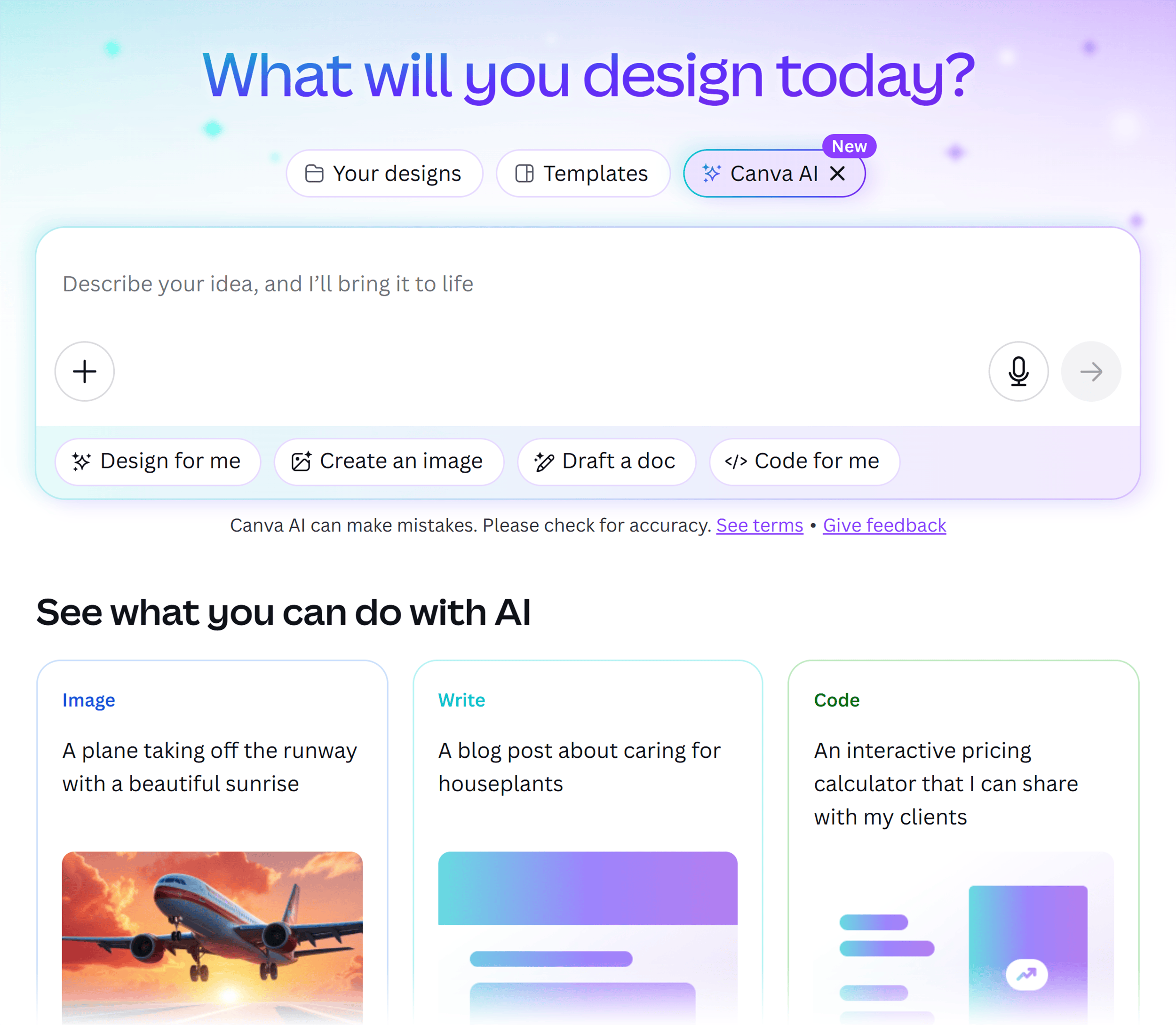
I put this to the test by asking it to create a slide deck based on a Backlinko article.
My prompt included copy for each slide.
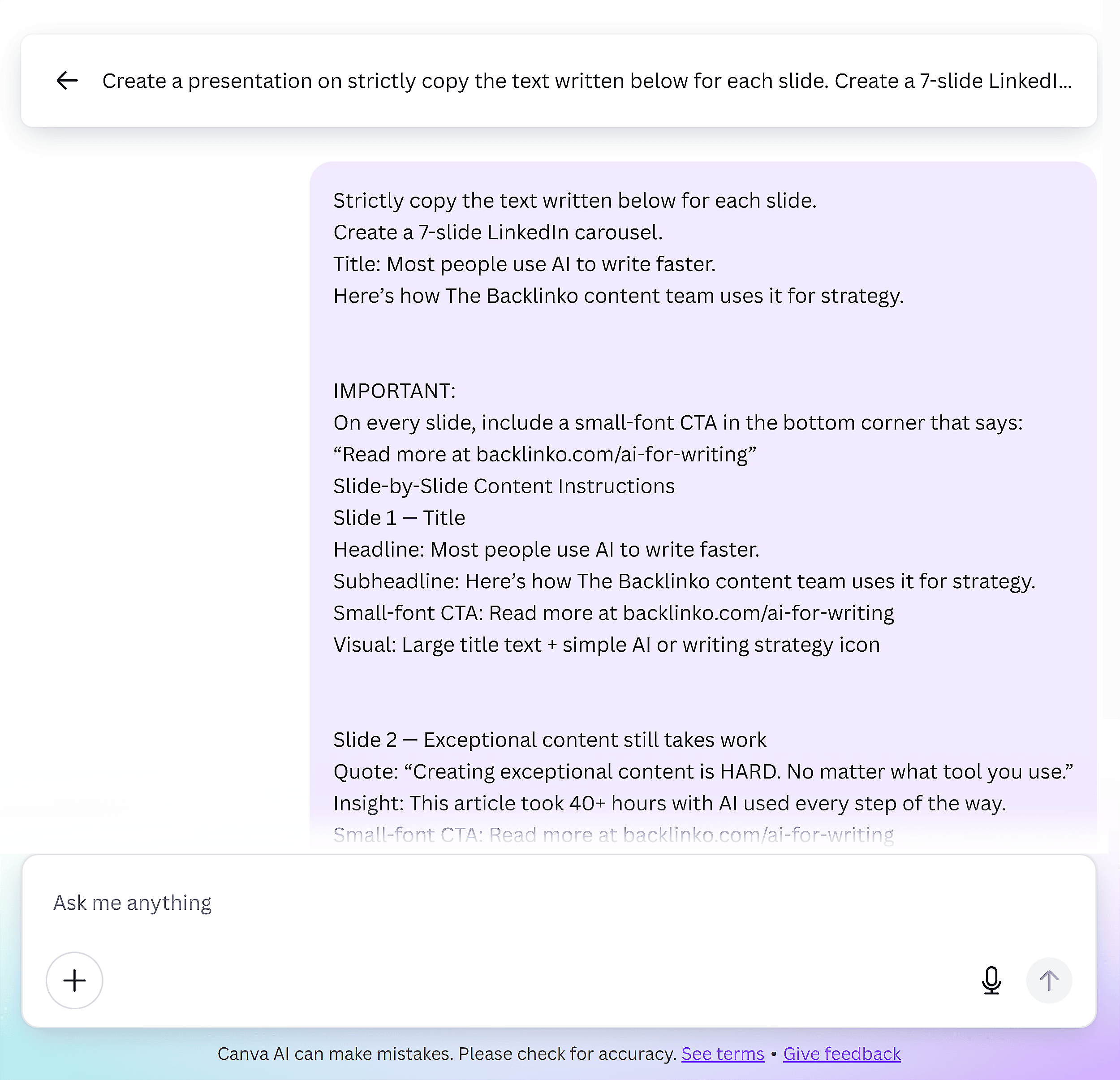
So, how did Magic Studio do?
It generated four slide decks for me to choose from that were pretty good.
But it didn’t follow the exact copy from my prompt.
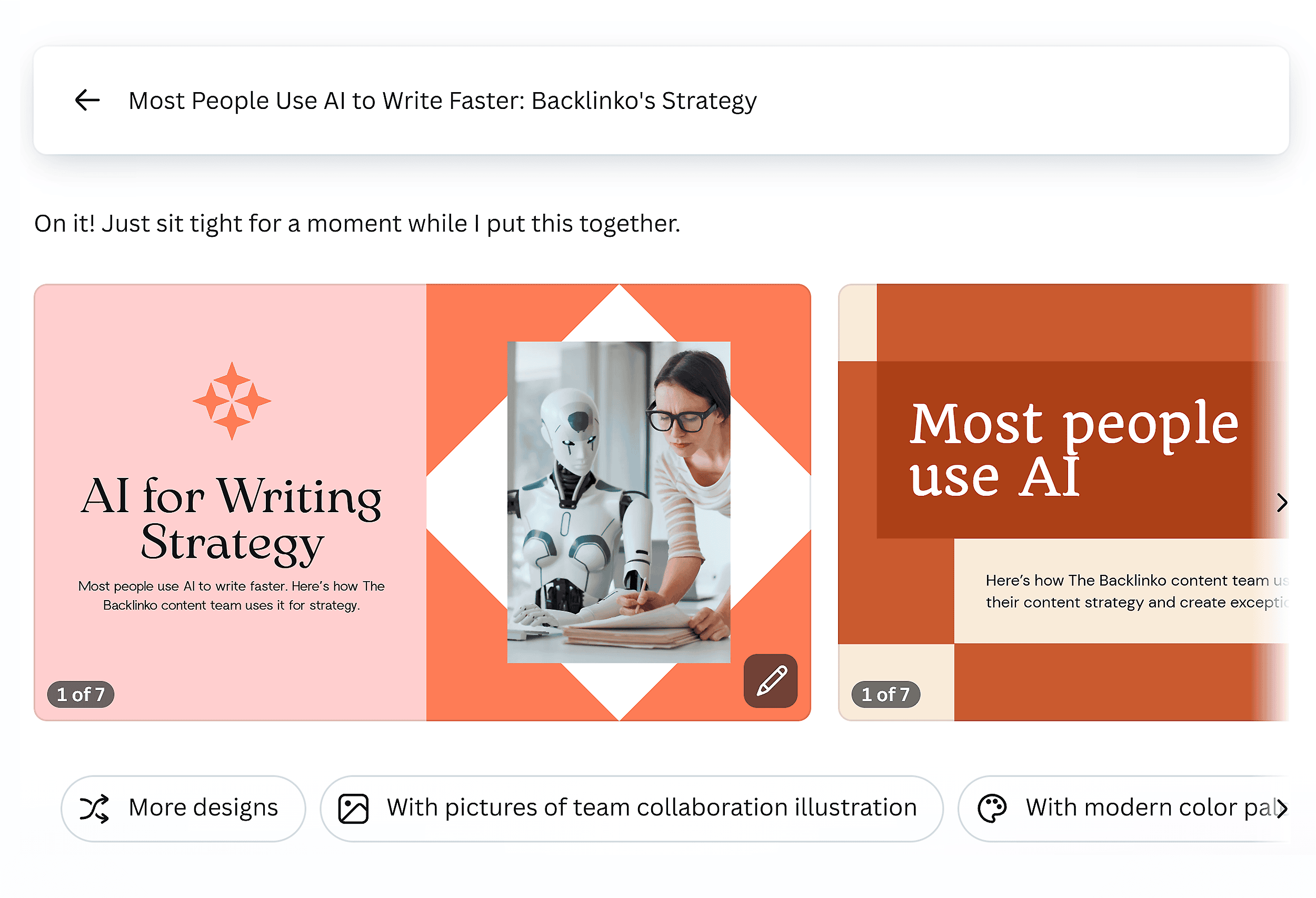
So, I had to tweak the text and update the images. (Which was super easy.)
While the AI image generator made generating visuals simple, I wouldn’t exactly call it “fast.”
It would’ve taken me at least an hour to build Canva slide decks from scratch.
But with Magic Studio, it took me about 15 minutes. Not bad.
Check out the final output below.
What do you think?
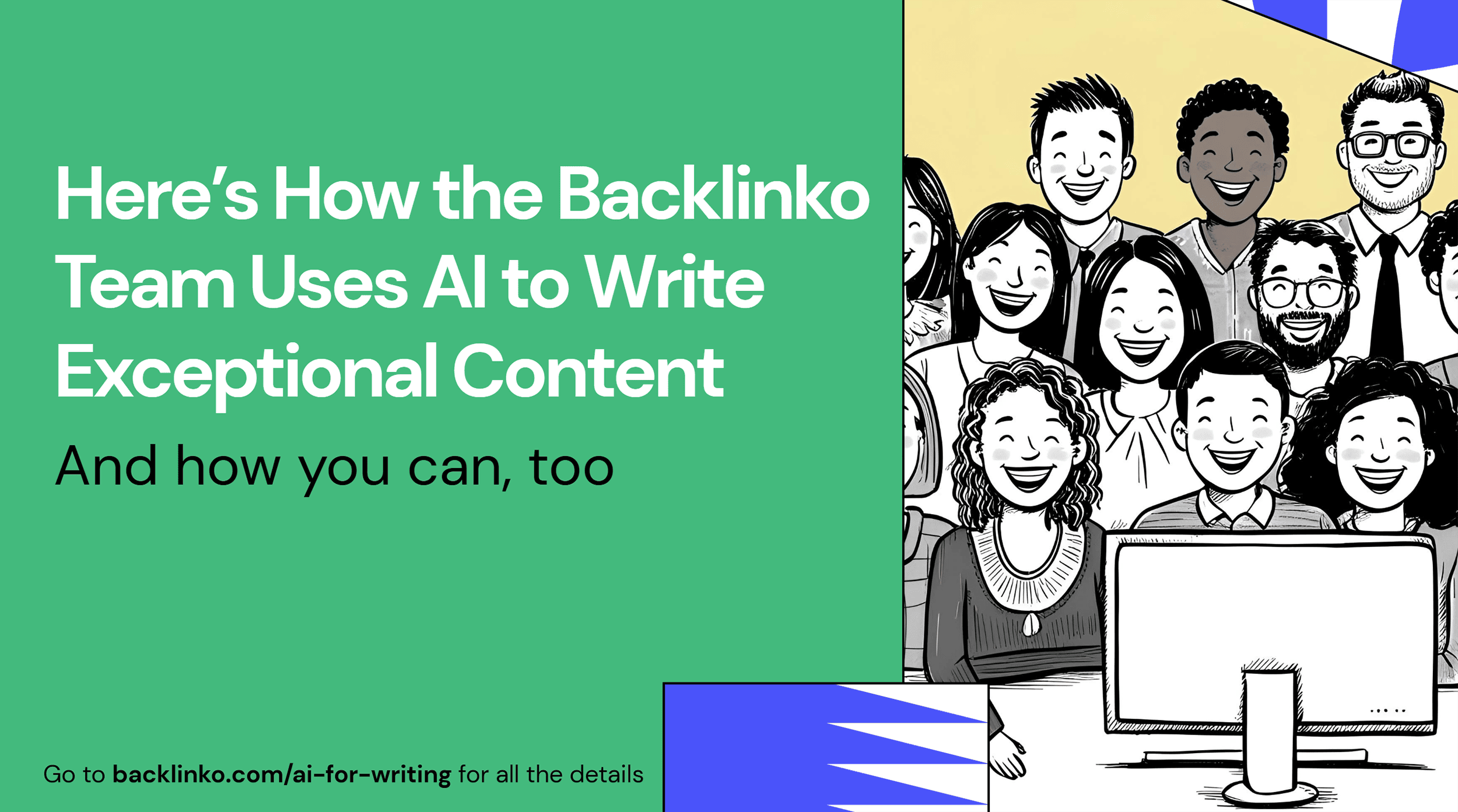
Pros and Cons
| Designs match Canva’s modern, ready-to-use template quality
Offers multiple layout options per prompt so you can easily choose the best fit for your content |
AI doesn’t always follow detailed prompts closely
No dedicated format for visual assets like LinkedIn carousels Needs a bit of refinement to get it just right |
5. Synthesia
Best for video creation without filming
Price: $29+/month; free plan available (no downloads)
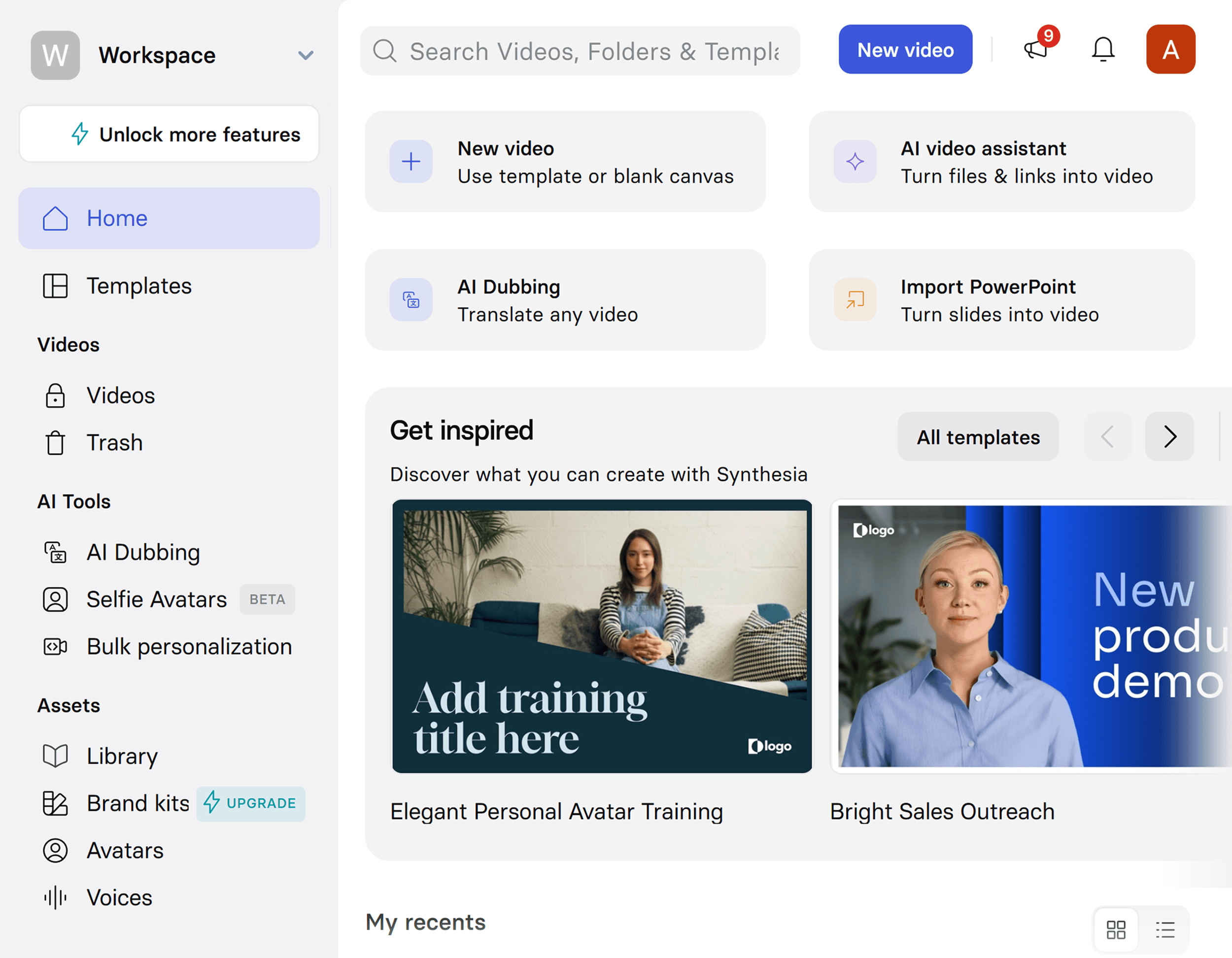
Synthesia is one of the fastest ways to turn your ideas into presenter-style videos.
Use it to create:
Product demos Staff training content Explainer or onboarding videos Global communications in different languagesWith over 200+ AI avatars and support for over 140 languages and voices, it’s great for teams that need professional multilingual videos fast.
Even better?
You don’t even have to step in front of a camera.
Create Videos Without Filming
Synthesia lets you create a video from a file, URL, prompt, or script.
You start by entering your inputs into the AI Video Assistant.
For this test, I used this URL: https://www.semrush.com/kb/801-advertising-toolkit.
I wanted to create a promotional video for Semrush’s PPC Advertising Toolkit.
Synthesia’s AI assistant guided me through the process.
It prompted me to enter the URL and fill out key details: video length, audience, tone, objective, and speaker.
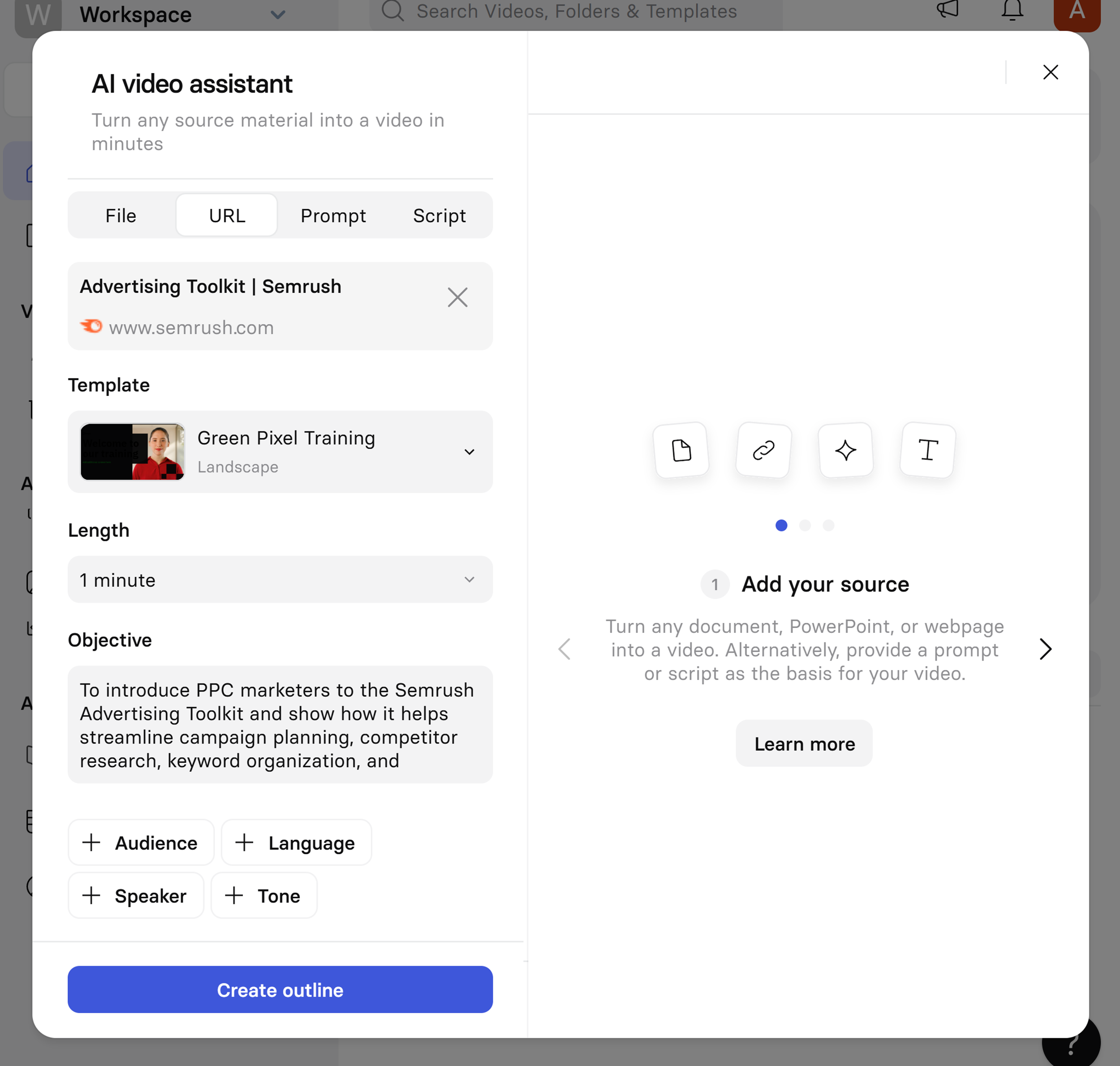
Synthesia then generated a video outline.
From there, I could:
Add or delete chapters Change the avatar and voice Tweak the script for each scene Add music, transitions, or new slides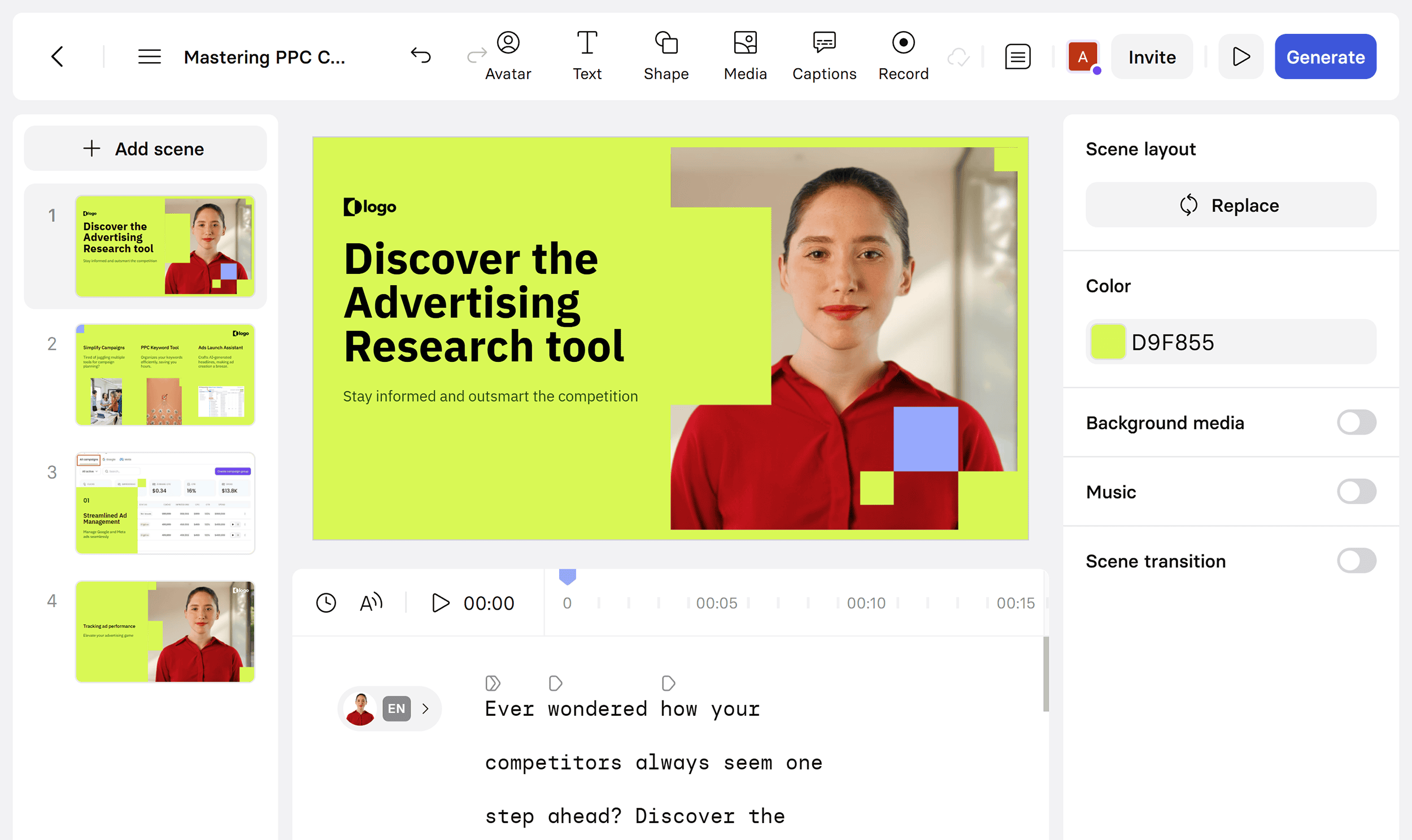
I made a few changes that included swapping out my avatar from dozens of options.
(You can also record yourself to create a personal avatar.)
Was the result flawless? Not quite.
The script needed a little polishing, and the AI avatar was… obviously AI.
But for an AI-generated video, with no filming, editing, or voiceover work, it was impressively functional.
Localize Videos
Synthesia’s AI recreates videos in over 140 languages and dialects.
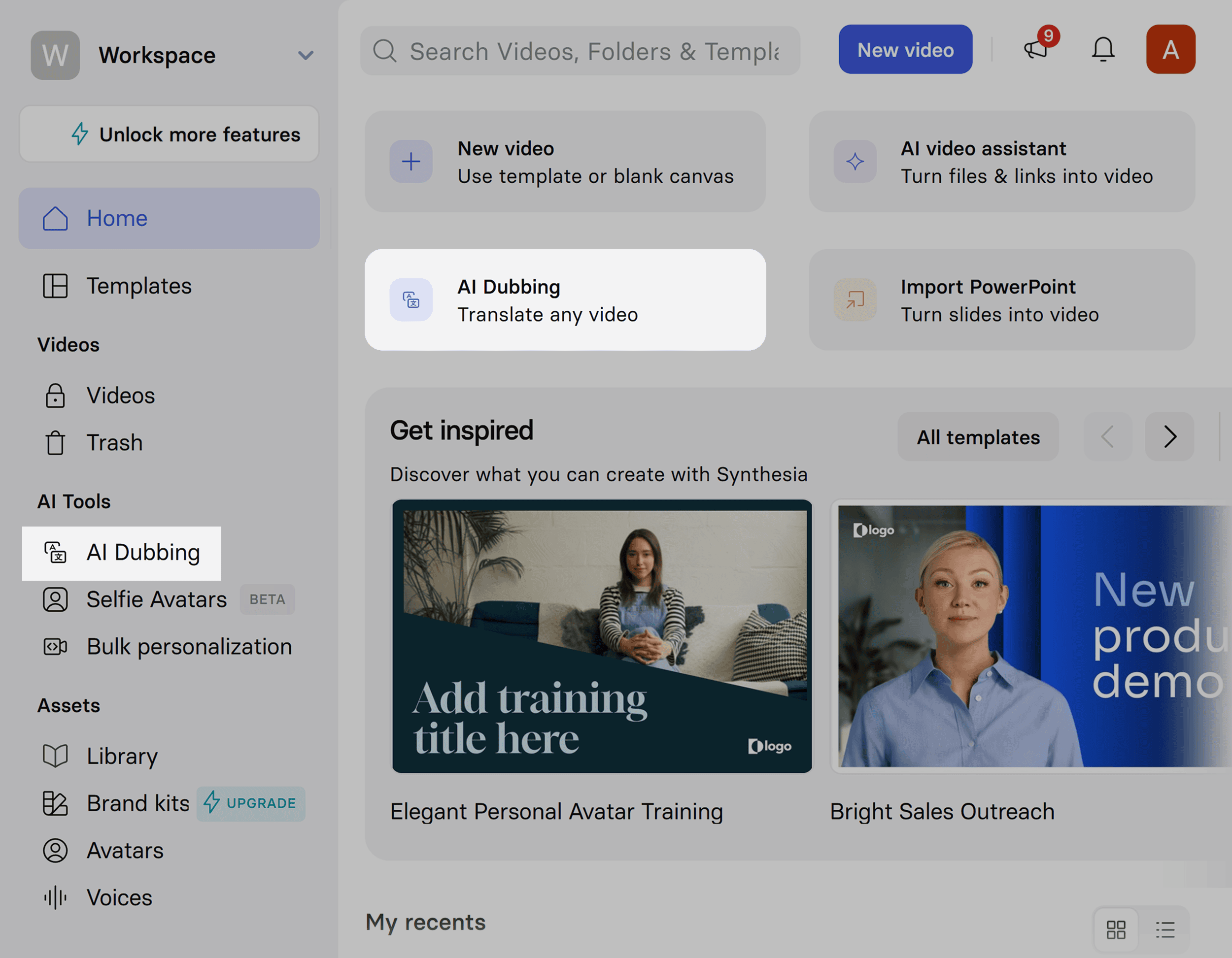
This means global brands and organizations can create localized video content without hiring voice actors or re-recording footage.
For my test, I uploaded one of my TikTok videos and asked Synthesia to generate a version in French.
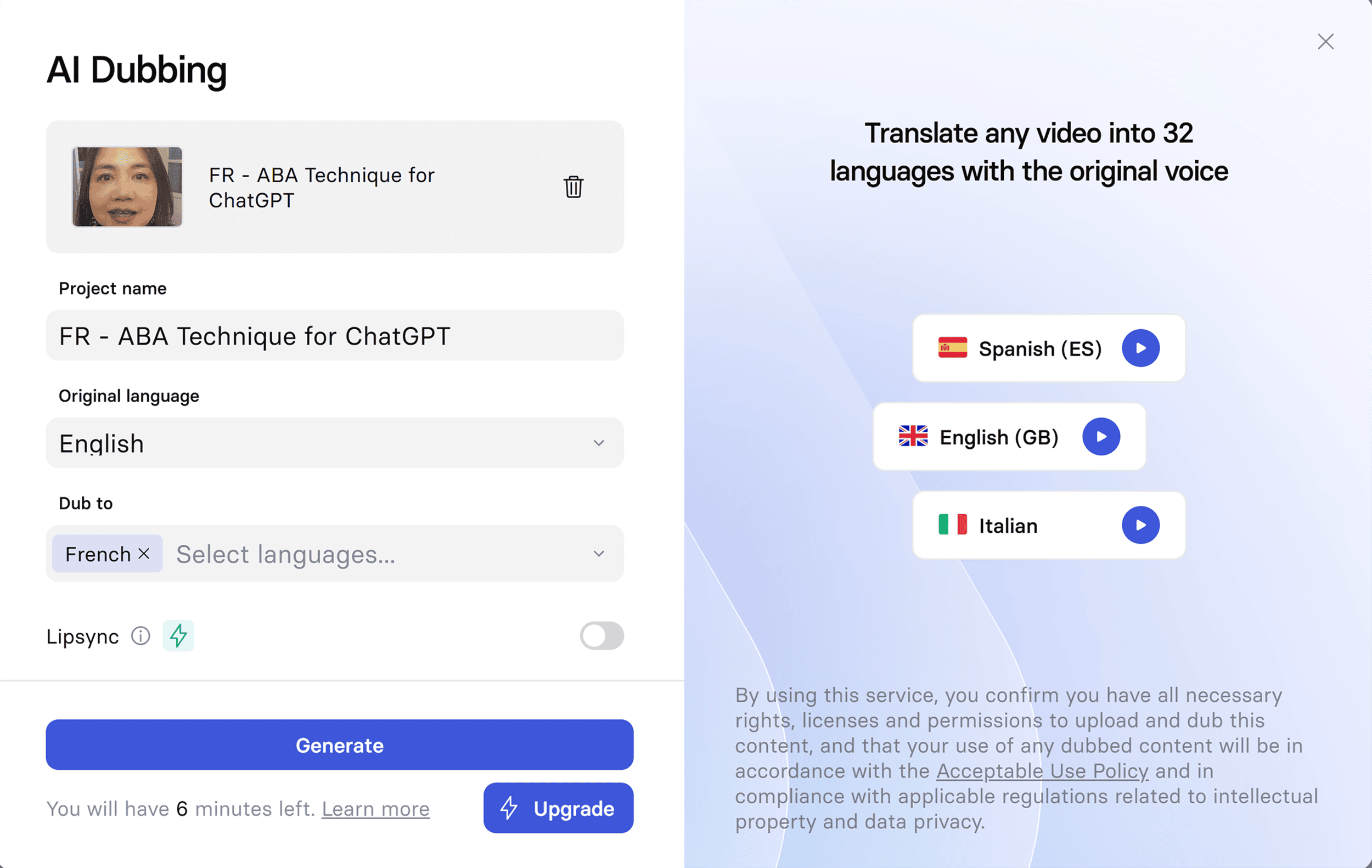
The result? Uncannily good.
Hearing “myself” speak in French was impressive, surreal, and erm…hilarious.
But it worked. And it worked fast.
Pros and Cons
| More than 200 customizable AI avatars means you don’t have to appear on camera
Creates videos in 140 languages so you can quickly make versions for different markets |
Avatars feel a bit robotic, with limited emotional tone
Video limits are tight: the Pro plan ($29/month) gives you only 10 minutes of video per month. For additional video time, you’ll have to upgrade to the next tier. |
6. AdCreative.ai
Best for scaling high-performing ads
Price: $39+/month; free plan available (up to 10 downloads)
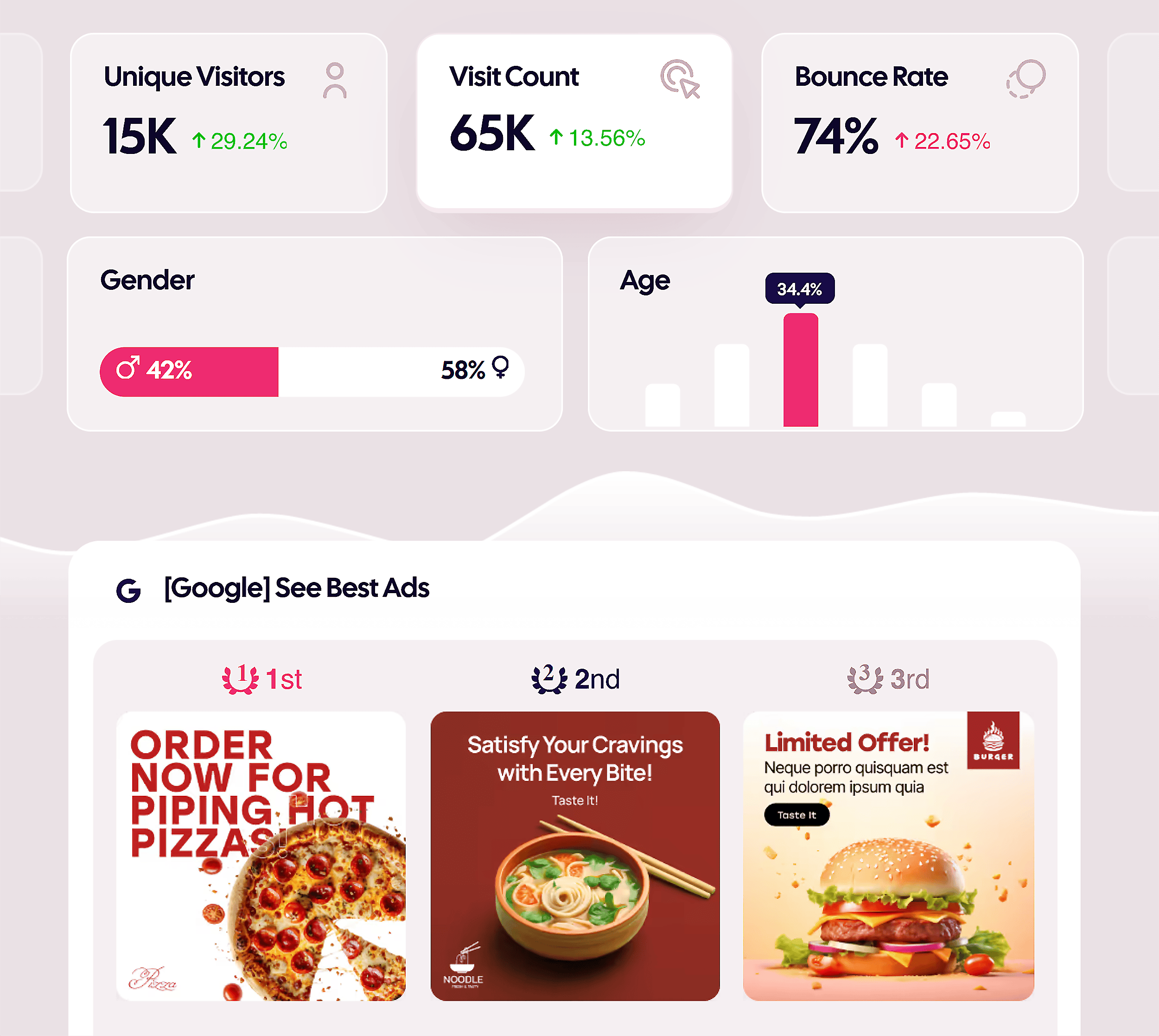
Running paid ads? You need AdCreative.ai.
It builds complete ads (visuals + copy + CTAs) for every major platform in minutes. Including Meta, Google Ads, LinkedIn, and more.
The game-changer?
It’s trained on billions of high-performing ads, so every output is based on proven conversion patterns.
This means you’re not just getting random designs.
You’re getting pre-optimized ad creatives based on what’s already working in your niche.
Create Ads at Scale
Adcreative.ai keeps you on track when you’re working on multiple campaigns and drowning in last week’s ad copy rewrites.
Start by setting up a basic brand profile with your logo, colors, and short description.
Then, choose the type of asset you want to create: static, video, or text-based ads.
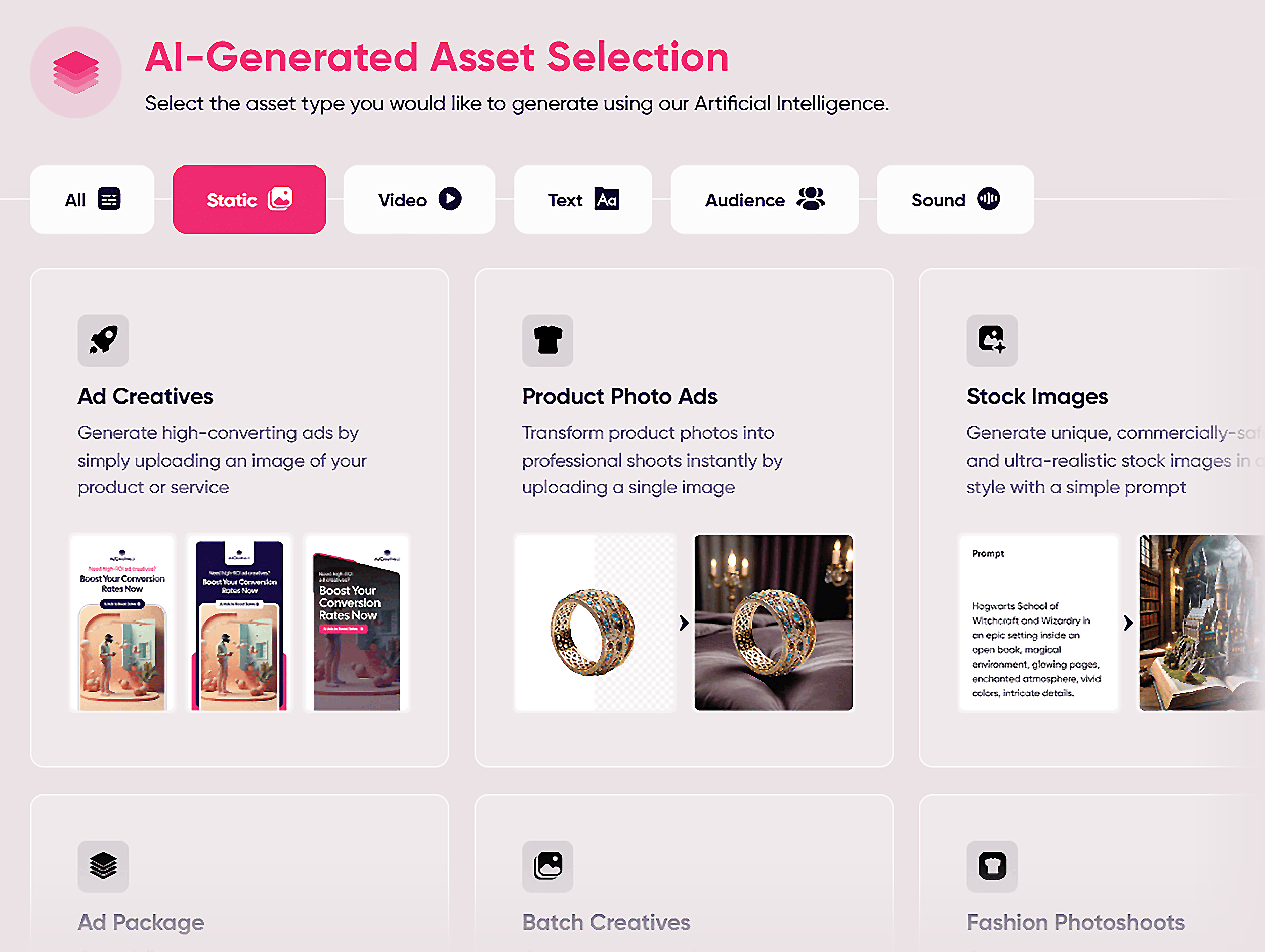
I tested this tool using one of my Backlinko articles.
First, I had it scan the site so it could understand the brand.
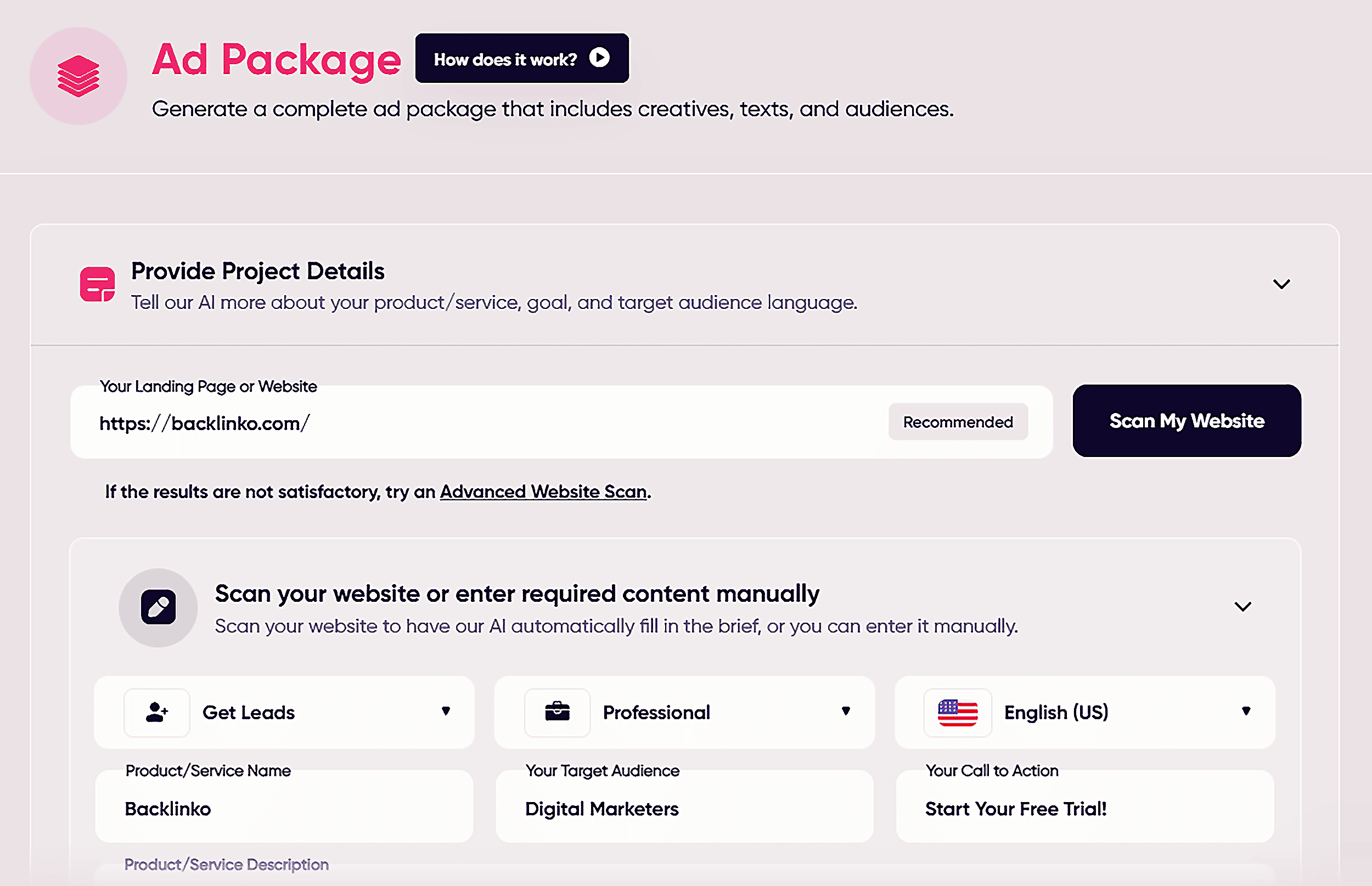
It automatically pulled in Backlinko’s brand details.
Then, I entered the article URL so it could scan for relevant content.
After that, I customized the ad including:
Choosing LinkedIn as the ad platform Picking an ad format Uploading a background image (optional)I clicked “Generate” and within seconds, I had a full batch of ad variants ready for use.
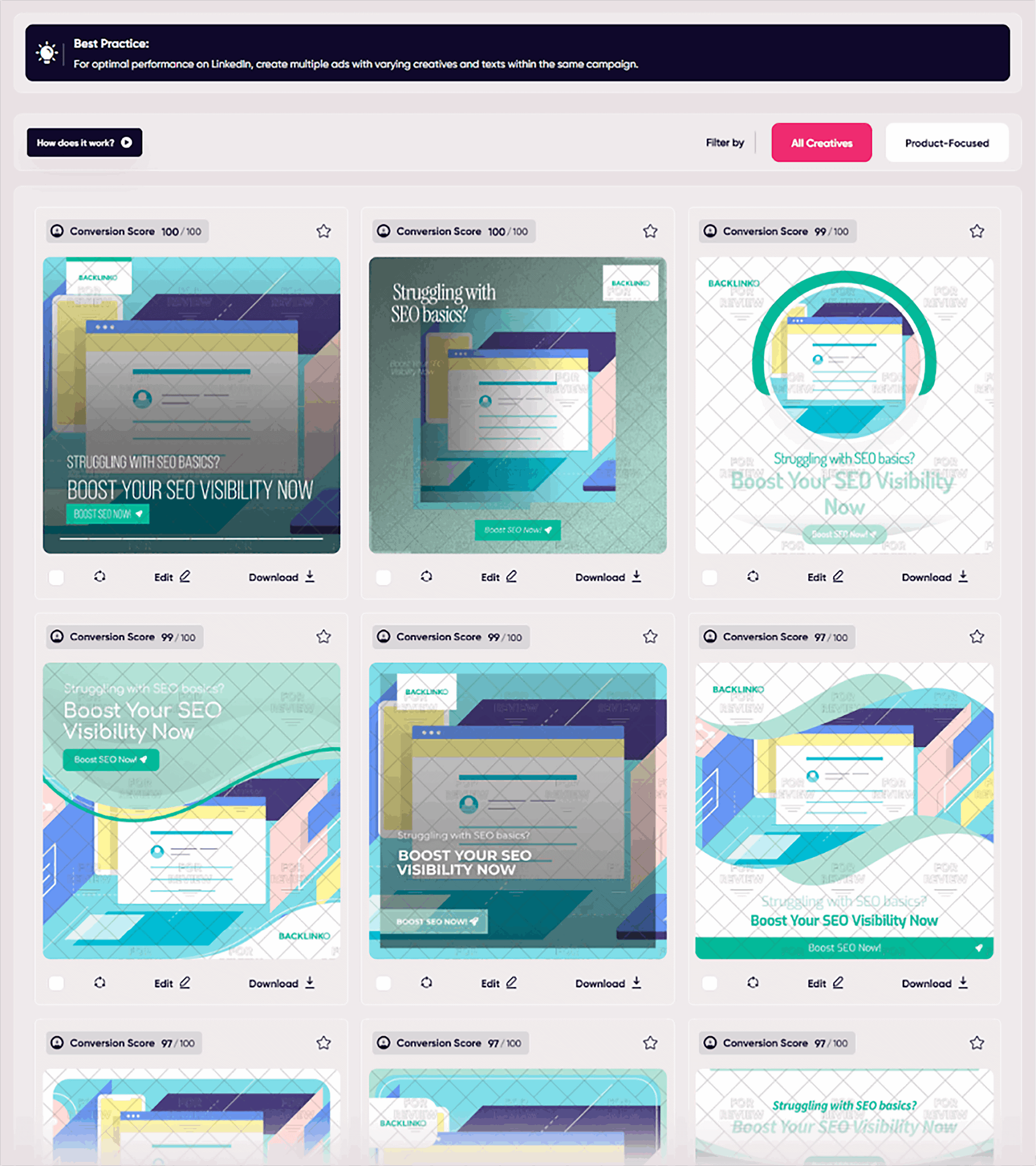
Each ad came with a layout, copy, and a “Conversion Score” — AdCreative’s prediction on how well the ad will perform.
Pretty cool.
The results weren’t perfect — a few looked a little rough out of the gate.
But every element was editable in the Creative Studio, so with a few quick tweaks, they were publish-ready.
Pros and Cons
| Built-in “Conversion Score” helps you prioritize top-performing variants
The tool analyzes your brand assets and automatically learns your goals, ideal customer, and brand voice |
Some default designs feel generic or visually cluttered
Ad downloads are capped monthly, which adds up quickly when running high-volume campaigns |
7. HubSpot
Best for AI marketing automation
Price: $20+/month/seat; free tier available (basic CRM)
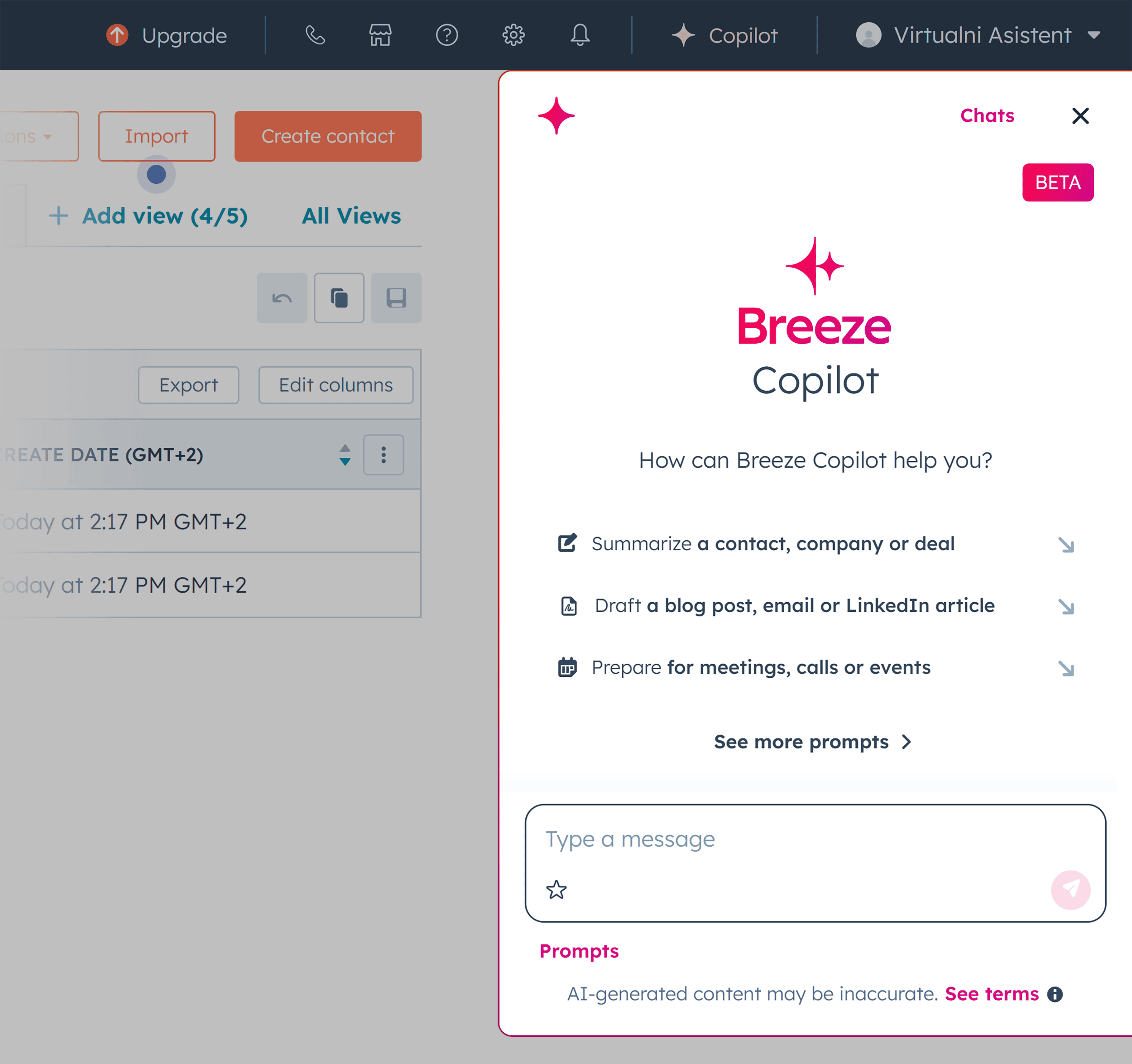
HubSpot integrates email, ads, content, automation, and customer tracking with your CRM.
Their AI (called Breeze) learns from your actual data, such as your:
CRM records Campaign performance Customer behaviorThis means you get insights specific to your audience and your sales process.
Not generic AI advice based on everyone else’s data.
That makes it feel less like software and more like a teammate who gets your business.
Identify High-Intent Leads
HubSpot’s Breeze Intelligence identifies qualified leads from your
What's Your Reaction?








 Hollif
Hollif 
